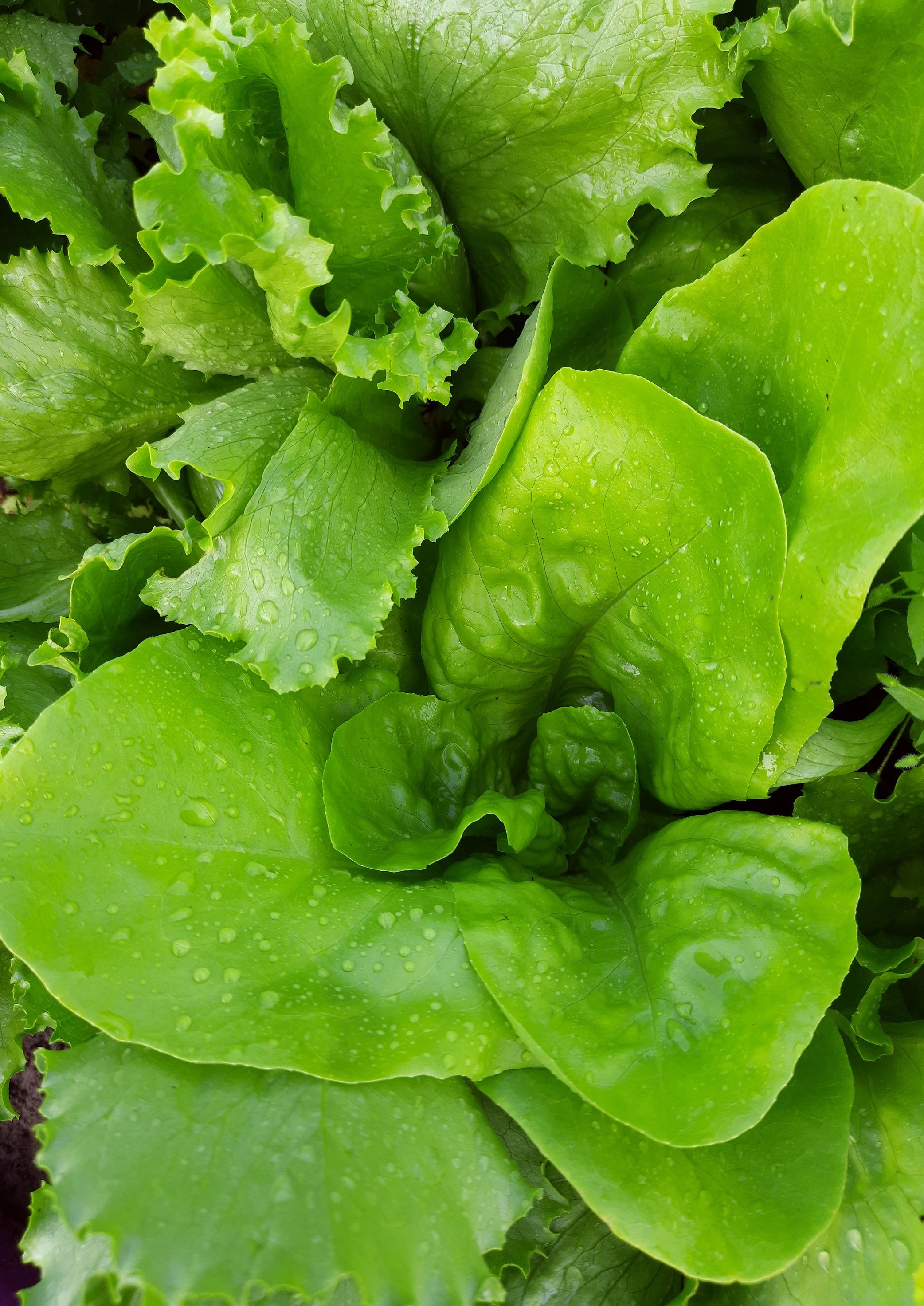Foodsight





Hello and a ‘warm’ welcome to our 2024 summer edition of Foodsight.
It’s a warm welcome return of the days getting longer, albeit not actually much warmer… or drier yet!
As with our previous editions, this is a content-packed edition of Foodsight which I hope you enjoy and find useful. We open with a summary of all the food and diet related awareness events, over the next few months.
This ready reckoner is aimed to be an easy reference and planning tool, to aid your busy operations.
General inflation and, more topically, food inflation does thankfully seem to be continuing to reduce – down to 4% for the 12 months to March.
 Oliver Hall Managing Director
Oliver Hall Managing Director

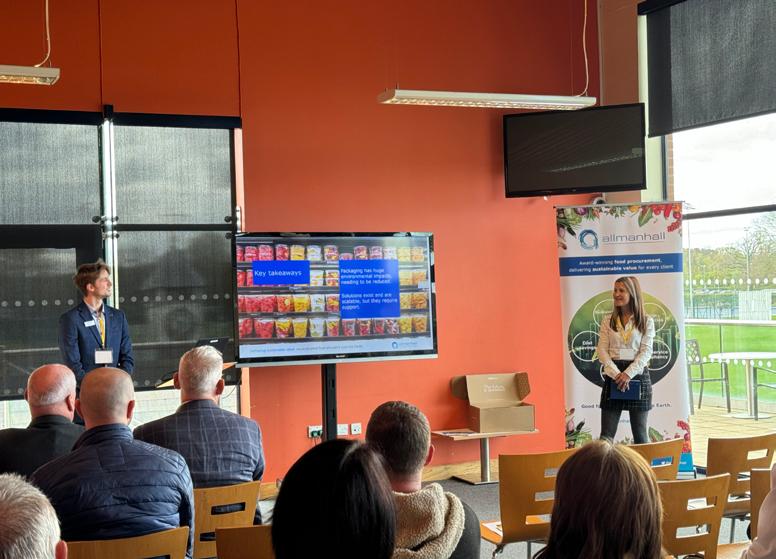

From page 10, we take a look into this in detail. Our regular Commodity Heatmap on page 12 is showing more oranges and greens, although there are some indices that are stubbornly red. We expand on these in our detailed Commodity Overview on pages 14.
The hugely important although challenging area of food labelling, in this instance vegan labelling and precautionary allergen labelling, is discussed by our Dietitian in the piece on page 20. And a piece on carbon labelling is shared on page 17.
If coffee is your thing, we have a fascinating interview with Clifton Coffee Roasters on page 24.
With ongoing macro issues being experienced around the world, on page 32 we explore some of the key areas that already are, or could, impact the food supply chain here in the UK.
On page 33 we summarise independent benchmarking findings and competitive analysis and on page 34 you’ll find a piece on positive impact, both in line with our ongoing commitment to delivering sustainable value.

From page 37 we have shared a number of case studies, which bring operational elements to life and explain how they are implemented in practice. From financial savings, process efficiencies, improved supplier engagement, nutrition and allergens, levering technology and delivering sustainability improvements – all are achievable collaboratively and without trade off or compromise! We’ve shared the key take aways and highlights of a recent Forum from page 44 which also provide insight on a range of topics covered by the case studies, and more!
At allmanhall, part of our purpose is to ‘allow informed decisions to become clear’ for our clients. Throughout this edition of Foodsight we consider the sustainability impacts, from carbon labels of foods and recipes or our recently awarded EcoVadis Gold rating and our own ESG report. Excitingly, you will find hot-of-the-press coverage of our burger concept trial, in collaboration with Redefine Meat and Epsom College to name but a few, on page 50, complete with feedback and photos from the day as well as carbon emission and nutrition details.
There are also great pieces regarding sustainable diets from pages 52 and some useful product codes and recipes can be found on pages 58-73 You can learn about partnerships in this edition and, at the very back, we share some reading list inspiration in our latest ‘Book Corner’!


At allmanhall we will continue to understand, manage and where possible, mitigate the macro factors. We will maintain and develop relationships on a local level to negotiate terms with our joint suppliers to ensure that we can continue to deliver value and the most competitive arrangements for your organisation.
Please do not hesitate to contact me, or any or the team, if you have any queries or requests. I hope that you find this edition of Foodsight supportive and insightful.
Very best wishes,
 Managing Director
Managing Director
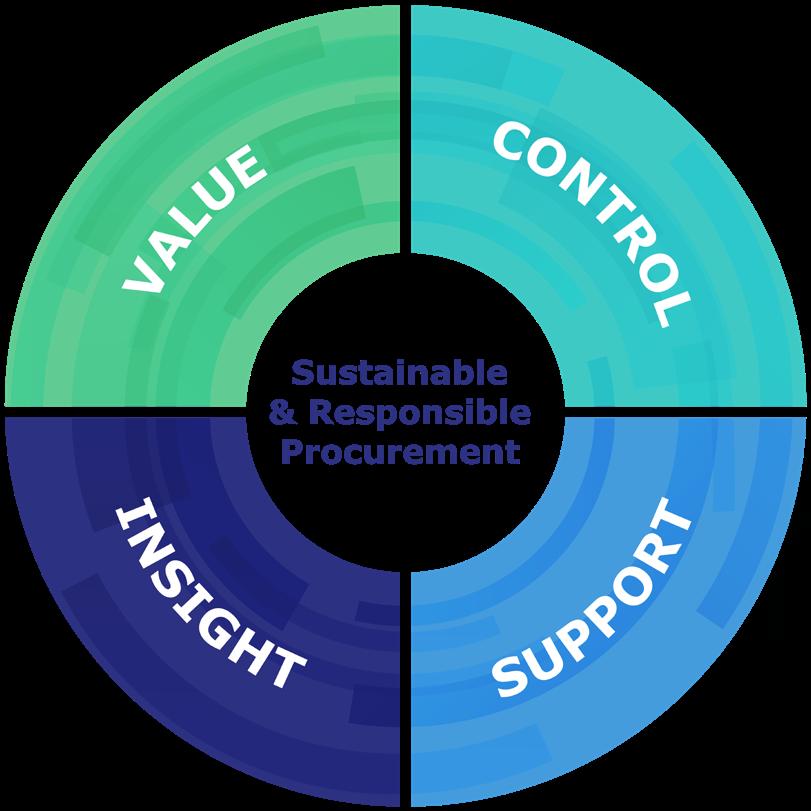
Events and food dates to look out for this summer
Our top picks for this summer
Food Inflation and availability outlook
Insight into the recent effects of inflation and what to expect
Commodity Heatmap
Giving you a clear picture about key commodity movement trends
Key commodities update
A deep dive into commodities - what’s going on and why
Carbon Labelling
What is means and why it matters
The confusion around vegan food labelling
Are vegan foods safe for those with certain allergies?
An interview with Clifton Coffee Roasters
We sat down with Paul Griffiths, Director of Coffee at Clifton Coffee Roasters
Shortages in the food supply chain
What and why?
Independent benchmark analysis findings
A summary by Finance & Systems Director, Martin Little
behind our
Real results: case studies
Hear from foodservice teams about the solutions and support they’re enjoying
Event exclusive: education catering forum
Highlights & key takeaways from the recent forum
We’re starting a burger revolution
Epsom College trial new collaborative concept
Plant-based meat alternatives & fish in a sustainable diet
We take a look at whether we should be eating more plant-based alternatives
allmanhall partner with Forest Green Rovers
The greenest football club in the world!
Sustainable product alternatives*
Your guide to new & innovative products
Honey Roasted Sweet Potato, Apple & Sausage Tray
Try out one of our latest ‘Hero Recipes’...
Some suggestions from the allmanhall team
*Includes product codes from brands including...
Notpla, Devil’s Kitchen, Rubies in the Rubble, Fairfields Farm, Wildfarmed Flour, Moving Mountains, Quorn Foods and Veg Express...

Time for a Cuppa Week

By the time you’ve boiled your kettle, another person will have developed dementia. Over 944,000 people in the UK are affected by the condition – if someone you love is living with dementia, you’re living with it too.
Get involved...


11th May
World Fair Trade Day is an opportunity to envision a world where trade helps support small-scale farmers, producers, and their families, cultivating healthy and sustainable communities around the world.
Mental Health Awareness Week 2024 will take place from 13 to 19 May, on the theme of “Movement: Moving more for our mental health”. Movement is important for our mental health. But so many of us struggle to move enough.
We know there are many different reasons for this, so this Mental Health Awareness Week we want to help people to find moments for movement in their daily routines. Going for a walk in your neighbourhood, putting on your favourite music and dancing around the living room, chair exercises when you’re watching television – it all counts!
Click here to learn more

UK BBQ Week is an idea born by a group of BBQ enthusiasts who want to show more people how easy and rewarding cooking outdoors can be, 365 days a year.
The great thing about this week is that it caters for all diets including vegan and vegetarian!
I mean honestly, what goes better on the barbeque than a good old corn on the cob?

National Picnic Week aims to encourage people to take the ideal opportunity to get together over a picnic with advice, tips, recipes and information to make sure you have everything from the food and drink to the location or surroundings.
Picnicking is one of the UK’s most enjoyable summer traditions, and is a great way of taking advantage of any open spaces in your local area over the warmer months of the year.
This is a serious day for all of us to reconsider our way of life and usage of natural resources. Our mother Earth can only regenerate resources at a finite rate. But we are utilising it more than this rate every year.
Earth Overshoot Day (also known as Move The Date) was introduced to raise awareness about the resource shortage that we are creating with our modern lifestyle. Once the regeneration of resources is at its limit, we exploit what is left of the resources, making the situation even worse. Andrew Simms started the idea behind Earth Overshoot Day to track the ecological resources and services we use from nature.
So, what are the solutions? Find out here...



Afternoon Tea Week, celebrated annually in the UK during the second week of August, is a charming tradition that pays homage to the quintessentially British custom of afternoon tea. During this delightful week, tea rooms, hotels, and cafes across the country host special events and promotions, inviting people to indulge in the classic afternoon tea experience.
Implementing this date into your calendar, especially in care homes, can be a great way to get much needed nutrients into a diet.
National Burger Day is a delectable occasion dedicated to honoring one of the most cherished culinary creations—the burger. A burger can be made in a variety of ways and served with different toppings to suit the taste of the one eating it. This is why it’s one of the most liked foods and appreciated and enjoyed by so many. Why not try a plant-based patty this year and reduce your carbon footprint?
Organic September is about celebrating the hard work and dedication that goes into growing while working with nature, not against it.
Learn more on how you can do your part here.


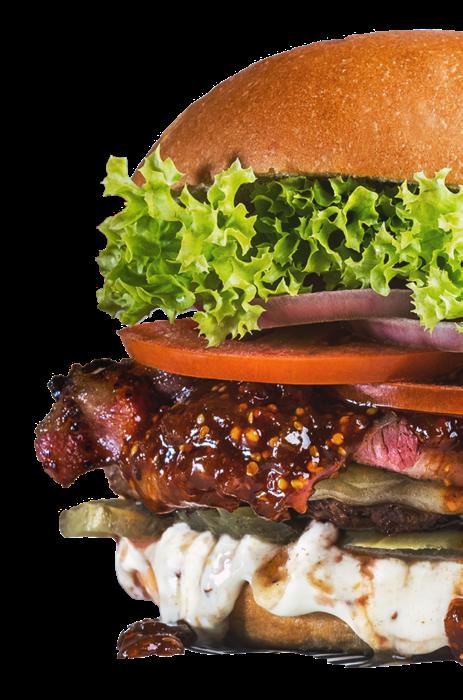
#SourdoughSeptember is an event seen across the UK during the month of September where baking schools, flour mills and bakeries will be running sourdough classes, tastings, feasts and more to demonstrate why sourdough is a superior loaf!
The aim is simple: to encourage more people to buy genuine sourdough or – even better – to make their own sourdough bread at home.


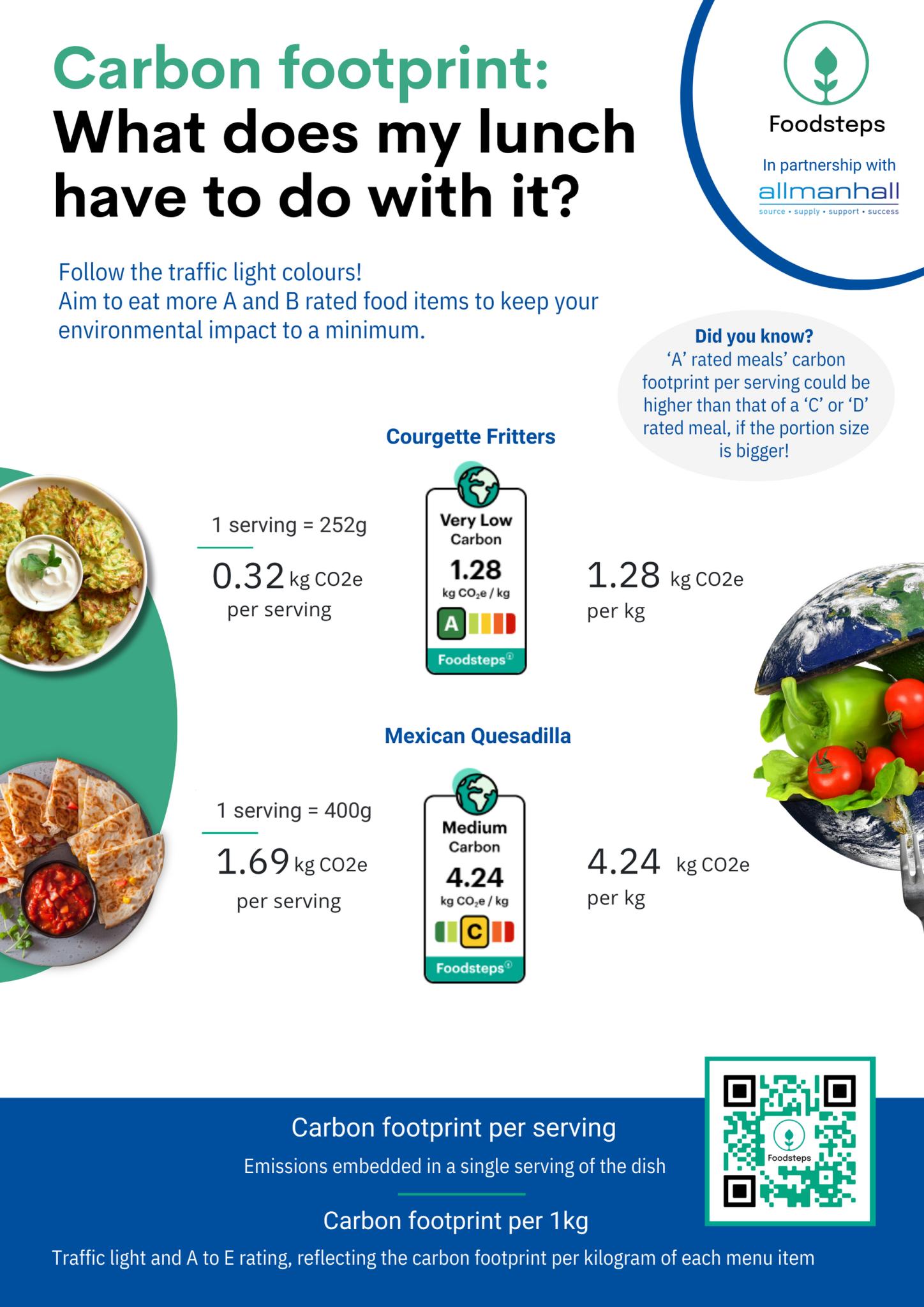


The rate of inflation for food and non-alcoholic beverages continues to decline.
The year-on-year figure was recorded at +4% in March 2024, the lowest levels since 2021. With the expectation that the Bank of England will soon reduce interest rates which at time of writing stand at 5.25% it looks hopeful that the rate of inflation will continue to drop.
This does not mean that prices are dropping, simply increasing at a slower rate.
However, as summer approaches, a time of year when Britain is typically more self-sufficient regarding food production, British farmers are facing huge challenges.
Britain has had the wettest 18 months ever recorded by the Met Office; this data goes back to 1836.
In 2024 Britain has already had over half of the expected rainfall for the year. February was the wettest February ever recorded in the South of England whilst simultaneously being the warmest on record which has ‘decimated crops’ according to the National Farmers Union.
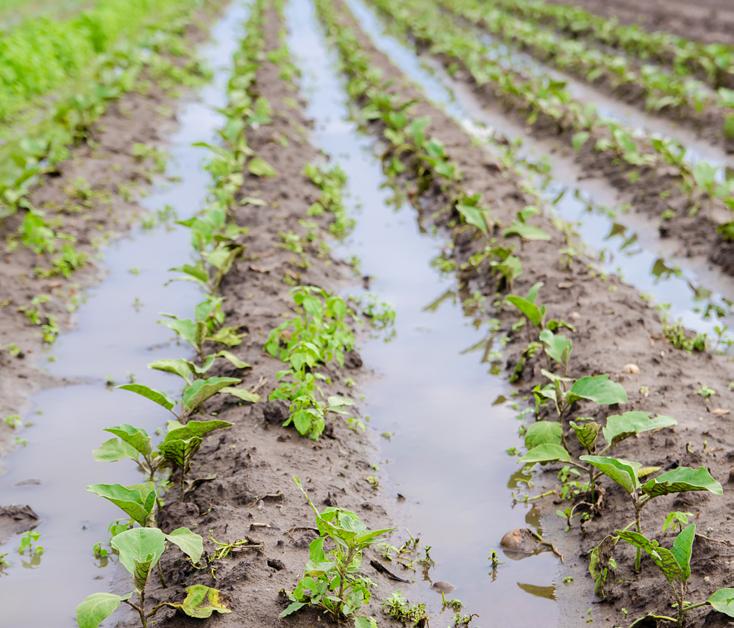
Foodsight: Summer Edition 2024
Arable farmers have planted as little as 50% of their summer crops due to fields being too wet for tractors which will inevitably cause shortages as stores dwindle.
The yields of what has been planted is also uncertain due to the weather and some seeds may have to be abandoned for the year due to late planting. Dairy and beef farmers have been forced to keep cows in barns longer than usual due to the wet grounds and are now running out of food.
This has caused some farmers to reduce herd sizes due to their increasing costs.

Moreover, concerns over food prices are amplified by import charges imposed post-Brexit.
All animal products, plants, and plant products entering the UK from the EU will be subject to these charges, with fees applied per type of good imported, up to a cap of £145 for mixed consignments.

Many smaller exporters, with multiple commodities per consignment, are likely to bear the brunt of this charge.
The sudden announcement of these costs by the British Government has left many businesses with insufficient time to adjust, compelling them to pass the additional expenses onto UK importers and consumers. There is a real fear that these charges could prompt some producers to cease exporting to the UK altogether. This scenario would result in a reduction in the variety of products accessible in Britain, consequently increasing demand for a more limited selection of goods. This surge in demand for a narrower range of products would likely to result in price increases.
We are committed to collaborating with suppliers to address any forthcoming supply challenges.
The Consumer Price Index (CPI) measures fluctuations in prices consumers pay for goods and services, while the Producer Price Index (PPI) tracks prices at the factory gate.
Traditionally, CPI follows PPI figures with a slight delay as products move through the supply chain. According to data from the Office for National Statistics (ONS), the PPI output figure remains at +0.2% compared to a year ago and +0.1% since February 2024. One factor that will affect the output figure, is the increase in the national living wage, which increased on 1st April 2024. The CPI inflation rate continues to decrease from the peak of 19.2% in March 2023.
In March 2024, the food and non-alcoholic beverage inflation figure stood at +4% compared to the previous year. Eight of the eleven categories used in the CPI methodology experienced a slowdown in inflation, except for vegetables, hot beverages, and soft drinks which all increased. The rate of food inflation still sits above overall CPI inflation, recorded at +3.2% in March 2024.
Due to the rapid rises experienced in 2023, both CPI and PPI figures will likely continue to decrease as these figures monitor year-on-year changes. While CPI remains positive, as mentioned before, this simply means that prices are increasing at a slower rate.
We will continue negotiating with suppliers providing beneficial outcomes, providing guidance on alternative products & range management, and proactively mitigating risks on behalf of our clients.


For mobile viewers, to view the whole commodity heatmap, enter landscape mode...

Although not yet pulling through in the heatmap, weather seen over the winter means that the production of wheat, barley and oats could fall by four million tonnes in 2024 compared to 2023. This is on top of geopolitical factors impacting wheat production. This would then have a subsequent knock on effect, increasing prices of produce made with these commodities (bread, biscuits and beer, for example).


Beef: In March 2024, farmgate beef prices in the UK hit a new high, setting a record of £5.07 per kg. Although prices have slightly eased since then, they remain 21% higher than the average over the past five years. However, uncertainties remain due to the British Government's new Border Target Operating Model (BTOM). Under this model, EU exporters of animal products must now provide Export Health Certificates (EHCs) to British authorities.
Additionally, physical checks on shipments will commence on April 30, 2024, followed by a requirement for safety and security certificates starting October 31, 2024. These new requirements may increase costs for imported beef and could lead to smaller suppliers refusing to export to the UK. This will lead to higher demand for UK beef. While this is advantageous for UK farmers, who will benefit from increased demand, it is expected to drive up prices as well.

Lamb: In March 2024, lamb prices surged due to a seasonal rise in demand reaching £8.35 per kg. At the time of writing, the British farmgate price stands at 54% above the five-year average. With Easter now over, prices are anticipated to decline but are expected to remain elevated.
The UK’s flock size is still recuperating from the impact of the “Beast from the East” storm, with levels still below those seen before 2018. Furthermore, there’s a possibility of further reduction in UK flock sizes in 2024, depending on the lasting effects of the Schmallenberg and Bluetongue Viruses.
Chicken: Rising avian influenza cases and increasing consumer demand for chicken, driven by the pursuit of cost-effective proteins, are contributing to the ongoing rise in prices, which currently stand at 17% above the five-year average. While there’s a possibility of feed costs decreasing as we approach summer, uncertainties persist due to ongoing conflicts in Ukraine and the Middle East, as well as adverse weather conditions.

Pork: After six months of decline, pig prices in Europe have begun to rise, experiencing a 2.9% increase in the last quarter. In 2023, EU pig meat production reached its lowest volume in over a decade.
Additionally, the EU pig population in December 2023 was the smallest recorded since data collection began in 2001. Decreasing herd sizes coupled with the uncertainties surrounding the British government's BTOM are likely to cause further price increases. Currently, prices are £1.88 per kg.

Dairy: GB milk production is forecasted to be 0.6% down compared to the previous year. One factor causing this is the weather, which has prevented the turning out of cows onto fields, reducing the amount of fresh grass consumed. Coupled with butter prices rising, this could reduce the availability of fresh milk over the coming months. However, Prices have remained consistent over the past six months but still sit 7.5% above the five year average.
Eggs: In the past year, UK food suppliers have raised their imports of eggs from Europe. The increase in imports is attributed to the reduction in the UK’s flock size caused by Avian Influenza.
Although the worst of the Avian Influenza outbreak is hopefully over, high input costs have deterred farmers from expanding their flocks. According to the Office for National Statistics (ONS), the price of UK eggs was 24% higher in the fourth quarter of 2023 compared to the same period in 2022.
Potatoes: In recent years, potato farmers have encountered progressively tough growing conditions, leading to subpar harvests, diminished production, and decreased yields. These challenges have prompted a reduction in potato farming areas, with plantings dropping by 10% in the ongoing season after 2022/23.
The situation worsened with heavy rainfall during harvest, resulting in many potatoes remaining unharvested in the ground, potentially causing up to a 25% loss for some farmers.

The UK potato industry faces a shortfall of approximately 1 million tonnes compared to consumption levels. Prices have surged by 42% in the last three months alone.
Rice: India accounts for 25% of the global rice market and holds a 40% share in global exports. In June 2023, the Indian government imposed a ban on non-basmati rice exports due to concerns about crop damage and the need to stabilize domestic prices. The El Niño weather phenomenon has further compounded challenges. Historically, El Niño events have led to below-average rainfall in regions like India, adversely affecting rice yields

Projections indicate that global ending stocks for 2023/24 will be the lowest in six years, leading to sustained high prices.
Currently, some prices are 20% higher than the five-year average.
Salmon: Norwegian salmon prices remain highly unpredictable, with peaks observed at the end of the first quarter in both 2022 and 2023. In 2024, prices have sharply risen since the beginning of the year, mirroring previous trends.
This is primarily attributed to the weakened Norwegian Krone and slower fish growth during winter, resulting in fewer fish being harvested as the is little incentive for farmers. As we transition into the summer months, prices may hopefully decline, as seen in 2022 and 2023. However, as of now, prices have surged by 18% in the last three months.

White Fish: During the spring, white fish species like cod and haddock enter their spawning season, migrating to colder waters and making them more challenging to catch, thus limiting the availability of fresh products. Frozen fish inventories, however, are ample and offer a viable alternative to mitigate supply gaps.
Yet, in the long run, the supply of cod and haddock will face additional pressure due to lower catch quotas in the Barents Sea throughout 2024.
Quotas for cod and haddock have been reduced by 20% and 17%, respectively.
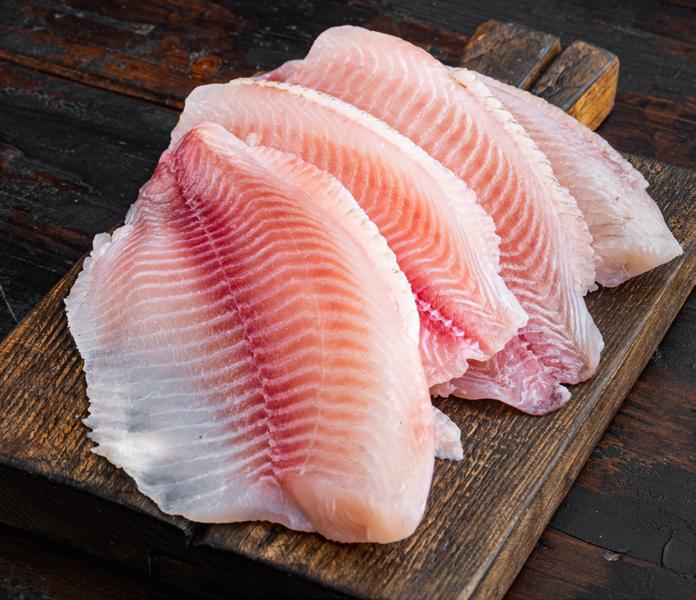
Oils: Global supply of olive oil is limited due to a decline in olive production. This has been caused by the severe drought and high temperatures during the 2022/2023 season, which has led to a tight supply of carry-over stocks. Recent rainfall in key Spanish regions (the world’s largest producer of olive oil) has increased production prospects, leading to prices reducing slightly month-onmonth.
However, prices remain 57% higher than last year. Although the March rains have increased optimism in a better 2023/2024 season, more rain is needed in April ahead of the dry and hot months of the summer.
Inflation has made olive oil unaffordable for many, causing a significant drop in demand, with consumers turning to alternative oils.
Although rapeseed oil prices have fluctuated by 7% from last month, the current price of rapeseed oil has decreased by 2% against last year and remains at 12% below the five-year average. There are ongoing concerns that the proposed implementation of tariffs on EU imports could disrupt the import of Russian sunflower meal and therefore the demand for rapeseed meal could increase, causing prices to rise.
In addition to this, there are suggestions that rapeseed production could be lower than expected due to weather conditions, which could also mean that demand outweighs supply.
However, since the peak experienced in 2022, prices have dropped by 55%.

Our food systems contribute to 26% of greenhouse gas emissions, accompanied by unsustainable land use changes and freshwater usage.
To decarbonise, menu choices need to be less intensive as we look to live within our planetary boundaries.

Understanding the carbon intensity of your meal choices can be challenging. However, innovative platforms like Foodsteps have enabled consumers to comprehend and align with these considerations, as they utilise easy to understand A to E ratings of products.
As carbon labelling becomes more prominent, it will become easier for consumers to make informed decisions. Frontrunning companies like Oatly and Tenzing now proudly display the environmental impacts of their products. For instance, Oatly showcases its impact of 0.44kg CO2e per KG of oat milk. However, as no other milk providers currently share this data, the planetary benefits of choosing this over other products can be overlooked. This is equally true for menus.
This is where Foodsteps stands out. Their innovative platform allows users to capture the entire carbon footprint of their menus, from raw ingredients to packaging, using a extensive database of product impacts. This data is then used to generate Carbon Labels, which refer to the greenhouse gas emissions released from farm to waste.
These labels, aligned with the planetary health diet and the 1.5-degree warming target, employ colour coding familiar to customers from nutritional labelling, allowing for quick analysis and understanding. In the pursuit of engaging stakeholders in aligning with planetary goals, tools like Foodsteps prove invaluable in enabling informed decision-making.

For further information on carbon labels or for a free trial of Foodsteps, please contact the team at allmanhall!
We can arrange a 5 recipe demo for you, totally free of charge.

Together with our partners and top innovators, allmanhall have collaborated to create deliciously tasty premium burger concepts that are kind to the planet and without compromising on taste.




Our revolutionary burger only emits 0.34kg CO2e


“ Finally, a burger that ticks all the boxes. ”
Incredible taste
Low carbon footprint
Reduced emissions
Tackles food waste
Regenerative farming
High in protein
Source of fibre
Comparable cost and value
compared to 5.77kg CO2e in a standard beef burger.
Are vegan foods safe for those with allergies and is it regulated by law?
In recent years the number of individuals following vegan diets and those with dietary restrictions due to food allergies have both significantly increased. Subsequently, the availability of vegan as well as ‘free from’ products has also become greater. This has resulted in confusion around labelling on products, which has, in some cases, been fatal.
New research by the Food Standards Agency (FSA) showed 62% of people who react to animal-based products, or who buy for someone who does, are confident that products labelled ‘vegan’ are safe to eat. This is incorrect and may be putting them at risk. Navigating food labels can be challenging as laws and products continue to change.
Here we examine the laws for food allergy labelling and vegan products, how to decipher it and how to safeguard those with food allergies....
The term “vegan” refers to products that do not contain any animal-derived ingredients or by-products. Vegan labelling on packaging provides assurance to consumers who choose to avoid animal products for ethical, environmental, or health reasons. In the UK, the use of vegan labels is not strictly regulated by law.
‘Free from’ foods are special ranges of foods made without certain allergens. If a label states that the product is ‘free-from milk’ or, ‘peanut free’, it has to be based on specific and rigorous controls. These controls need to ensure that the final product is completely free of the particular allergen. This includes checking that all ingredients and packing materials do not contain this allergen and that cross-contamination from other foods made on site is prevented.*



Commonly known as ‘may contain,’ these statements are voluntary and not regulated by law. PAL is used to communicate the possible unintentional presence of a food allergen at any stage in the food chain.
PAL includes phrases like:
• May contain nuts
• May contain traces of egg
• Made in a factory that handles peanuts
• Not suitable for milk allergy sufferers

Vegan labelling does not have a legal UK or EU definition regarding what they can or cannot contain. Voluntary labelling of terms such as “vegan” are covered by the Food Information Regulations 2014 and Consumer Protection from Unfair Trading Regulations 2008, which states products cannot be misleading, and as a vegan diet does not include animal products, by labelling a food vegan the food must therefore not contain animal products. This, however, does not mean the food will be safe from contamination or traces of animal products as a vegan claim does not need to go through any rigorous tests.
This means a food can be labelled vegan and have a PAL statement for milk or egg.
Vegan food can be prepared in factories and areas where products of animal origin may be present. This could mean that some vegan food products could unintentionally contain allergens.
The Vegan Trademark was designed to provide clarity for those following vegan diets and removing the need to read through ingredients list. And whilst the trademark standards require minimising cross-contamination as far as possible, rigours tests of complete removal of animal products are not required.
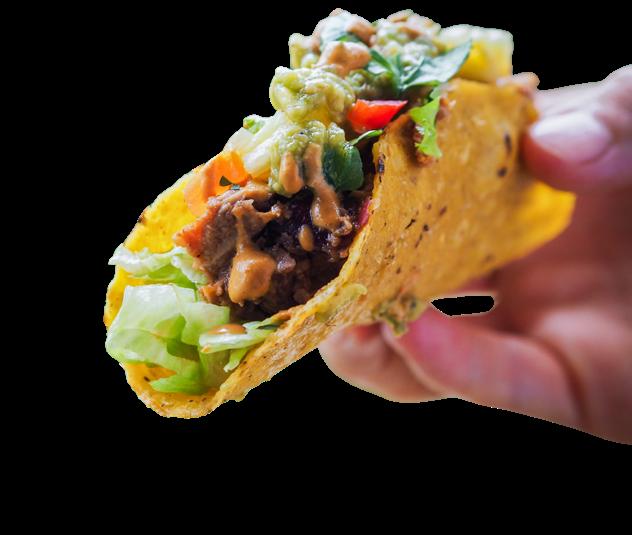
This is why many products include precautionary statements such as “may contain milk” while also being labelled as ‘vegan’. The Vegan Society does not claim that products registered with the Vegan Trademark are suitable for people with allergies to animal products; this depends on the standards achieved by individual manufacturers. It is this that has caused confusion for consumers, many wrongly assuming vegan products are suitable for someone with a milk allergy, for example.
Foodsight:
Vegan labelling does not have a legal UK or EU definition regarding what they can or cannot contain. Voluntary labelling of terms such as “vegan” are covered by the Food Information Regulations 2014 and Consumer Protection from Unfair Trading Regulations 2008, which states products cannot be misleading, and as a vegan diet does not include animal products, by labelling a food vegan the food must therefore not contain animal products.
This, however, does not mean the food will be safe from contamination or traces of animal products as a vegan claim does not need to go through any rigorous tests.

There is no agreed definition for ‘vegan’ in UK food law. This means that vegan food labelling is not about food safety.
Food safety labelling, like ‘free-from’ or ‘allergen-free’, are a guarantee that the specified food will be absent from the product. But vegan food labelling simply indicates that no animal-based ingredients were intentionally used.
Understanding this difference is crucial for individuals with food allergies, as the unintentional presence of allergens in a product labelled vegan can pose a risk and, in some cases, could cause fatal consequences.
 Author Tess Warnes Dietitian
Author Tess Warnes Dietitian
If you have a LinkedIn account, be sure to follow @allmanhall for the latest market updates, industry news, foodie insights, sustainability guidance, recipe inspiration, and much more!


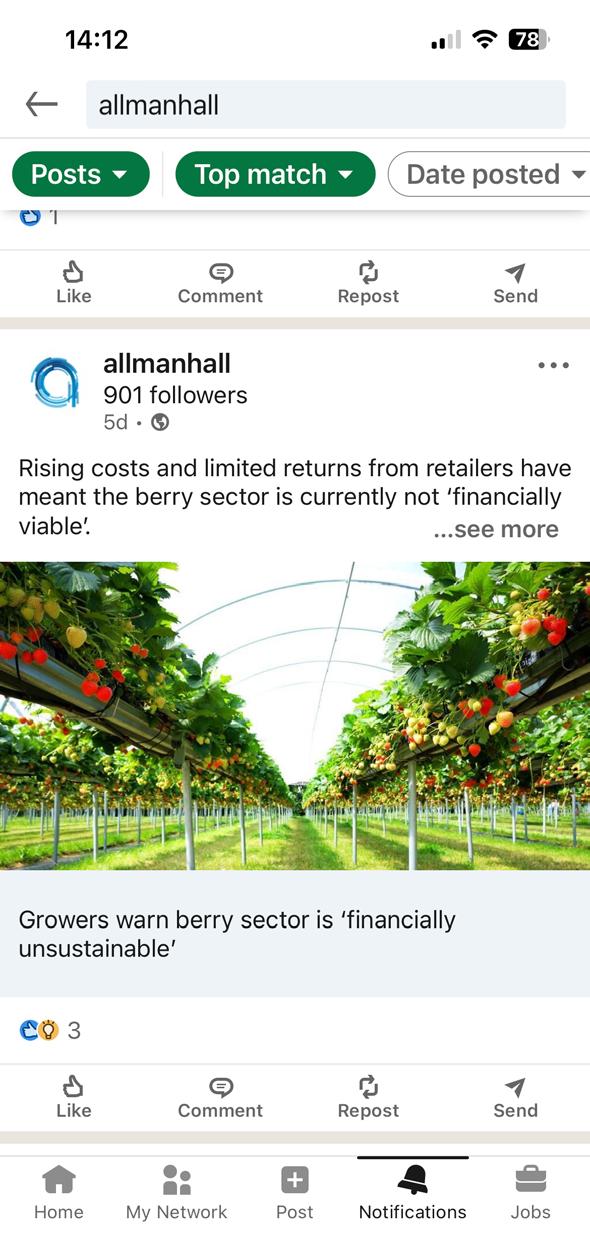
As well as sharing insights and updates, we regularly collaborate with partners including Foodsteps, UN Global Compact and Jamies Farm.
You will also get to see behind-the-scenes photos of our team and what we get up to!




The coffee market is such a complex and constantly growing industry and with coffee being such an emotive product, we sat down with Paul Griffiths, Director of Coffee at premium Bristol coffee roaster, Clifton Coffee Roasters...
LT: Let’s start with the basics, for those who may not have come across you so far, who are Clifton Coffee Roasters?
PG: We’re a coffee roastery and a one stop place for high-end, highquality coffee solutions. It was started back in 2001 by James Fisher – who still owns the business today –in Clifton Village with James driving around in his Ford Focus with Clifton Coffee on the side, repairing coffee equipment around the southwest and Wales.
Primarily we were a coffee machine maintenance and support company for many years. There wasn’t really a coffee scene and roasters like we know today, it was the big brands like Illy and Lavazza – the more traditional Italian brands –or a much more niche following in central London and that was really it, so there was a big opportunity to grow something completely new.
We started roasting shortly after that, purchased a little 12 kilo roaster, and we’ve still got that roaster today. We’ve established ourselves primarily as a businessto-business roastery.
About 94% of our business is B2B – growing and working with cafes from single site right up to our biggest customer, which is over 250 sites, offering coffee machine solutions, coffee options, training, and technical support.
LT: And what’s unique about Clifton Coffee Roasters and your coffee?
PG: As we started the roastery we wanted to do quite a unique thing for the time. There was only a handful of roasters around the world doing it, focusing on what we would now call direct buying relationships with producers, and we’ve run with this focus.
A lot of coffee roasters refer to ‘direct trade,’ but at Clifton we have direct sourcing relationships which are a longer-term thing. We’re committing to that producer for season after season of buying, normally buying different specifications for different customer types.
Our largest source of around 60% is an El Salvadorian producer called Ricardo Lima, that we’ve been buying from since 2015, so a really long-standing relationship in quite a unique coffee growing country. Previously one of the big players in coffee production, we chose El Salvador back in 2015 because of that uniqueness in our specialty market.
We work with Riccardo and his brother Fernando on the purchasing and export side of things, and they have an amazing spread of qualities of coffee right from high end competition lots that will go into a cup of excellence awards, down to solid scoring specialty grade coffee.

LT: You source from a wide variety of areas. How do you approach the sourcing process and establishing relationships with those farmers?
PG: Selecting producers to work with is pretty hard and there’s a lot of key factors that we think about. First things first, we want to set up a longer-term relationship. Generally speaking, the minimum we are buying from producers is three seasons. That’s our initial commitment, before we’ve even seen how the coffee quality over the years has changed, so we’ve got to be certain that that’s going to work. We usually do an in-person visit to a key farm. If you’re buying a container load or larger we need to visit the producer and see what’s going on in terms of their farming practices, the condition of the farm, how the plants are growing.
We gather information about their workers – how many workers they have, is it seasonal work, is it full time permanent employees. And if they’ve got any programmes for their workers or their surrounding community is a really key thing.
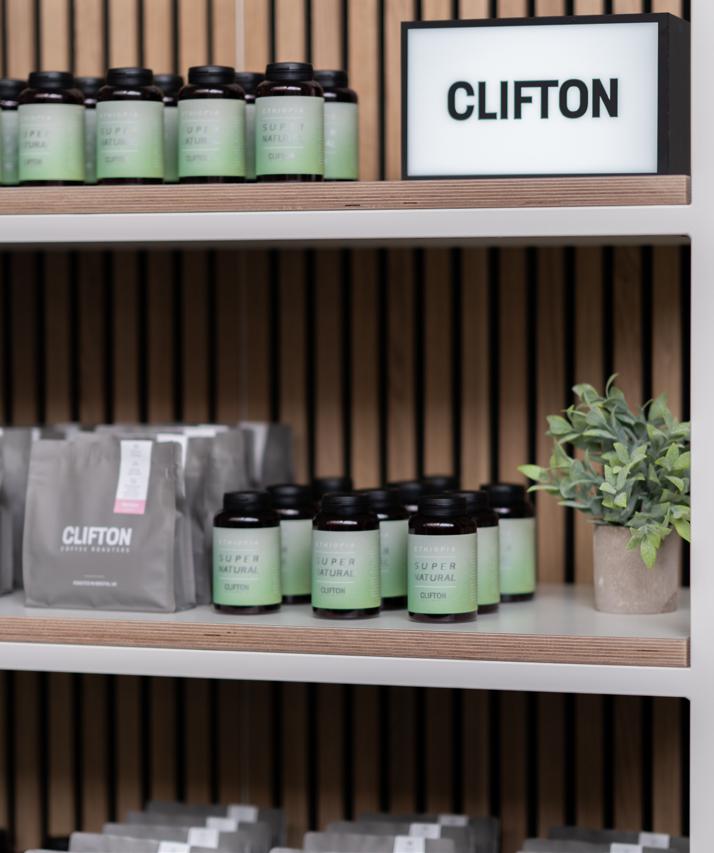 Paul Griffiths Director of Coffee Clifton Coffee Roasters
Paul Griffiths Director of Coffee Clifton Coffee Roasters
Once we’ve selected the coffee, we want to see that relationship through for a number of years, so if there are quality problems we try and talk to the producer and feed that back. To be completely transparent, we very rarely get quality problems. The work that goes in at origin level is key.
Seeing the condition of the plants and the farm and seeing their practices goes a long way. We also taste the coffee at origin, doing a lot of quality checks before we commit to purchasing coffee.
LT: And what sort of support do your producers offer their communities?
PG: For example, for our Suspension Espresso, which is one of our most popular lines, the producer works really hard on creating an amazing package for their staff and their families to support them. Grocery cover so they can eat healthily on a regular basis and provide for their family, dental cover, and other permanent staff benefits.
There’s also the social impact side around producing coffee. In recent years we’ve been working with a cooperative in Honduras called COMUCAP.
It’s primarily an all-women run community, which is amazing. When we first started buying from them it was just over 200 members of that cooperative, now it’s closer to 500. It started with a small radio show in Honduras for the local housewives.

Domestic abuse is quite a big issue in Honduras, so when the husbands would be going to work, they’d have this radio show to feed ideas about becoming more independent, starting their own businesses, and becoming confident enough to break out of these negative and abusive relationships.
To be able to sustainably start their own business and work together with other like-minded people. It’s obviously an amazing story and support mechanism there, and they produce delicious coffee. This year will be the second year we’ve been buying from them so it’s still a very new relationship.
LT: And from that we start to understand why it’s so important to Clifton Coffee and the consumer that the product is fully traceable.
PG: Absolutely. Maybe five to ten years ago the traceability became a much bigger factor - in all sorts of food and drink - but coffee especially.
Most specialty roasters at that time were buying what we call regional blends – or even national blends – like ‘Brazil’ with no traceability but to the country, not down to a farm or region level. We’ve completely flipped that on its head, tracing down to individual farms and families. The coffee

LT: You’re way ahead of the game!
PG: Absolutely, I really believe that. Don’t get me wrong, these regional blends or larger scale, slightly less – well very less traceable –still have a place within coffee, there’s still a market for those kinds of price points and qualities. But I think for the consumer that wants an elevated experience and a more premium coffee, it comes down to farm traceability or small cooperative which is what we’re focused on.
LT: You mentioned that in terms of quality you don’t see too many big issues. What are the challenges that both you and the farming partners that you work with face?
PG: From the farming and producer side, one of the biggest things is finding people to work picking, working on the farm, and working at the mill drying coffee and prepping it for export. In Central America especially, people want to live this very Americanised life, working in an office, getting a steady pay, and living a ‘normal’ kind of life. They don’t want to live in this agricultural, farm lifestyle which is hard – there’s a lot of physical work and early starts.
That’s the number one thing I hear from producers in person. Obviously, climate change is a big factor, it’s very country dependent from what I’ve seen and heard from producers. It is forcing producers to have to grow at higher altitudes if they want to maintain quality because of the change of temperature - as you go to higher altitude it becomes cooler.
And more disease resistant or climate hardy plants are a big part of coffee production. Choosing varieties that are more stable and can produce better yields.
LT: In terms of production, how does Clifton Coffee make sure you use more sustainable practices from the farming through to the end use?
PG: With our large lines specifically from Brazil or El Salvador, we look for key sustainable practices in their business model, right from the farm level. In Brazil (for our Suspension Espresso and our Village Espresso), the respective farms – called Fazenda Pinhal and Fazenda Bela Vista – do some great stuff.
They both use solar to power their equipment and their housing on the farms. They also do lots of projects with the local government and either abide by or go well above the minimum of their reserved land on their farms. In Brazil, you must have at least 20% of your farm as reserved land where you can’t plant on it, you must leave it in its natural state.
LT: And how does Clifton make choices based on more sustainable options?
PG: We went through the BCorp certification back in October 2023. It’s definitely the most multifaceted certification in terms of measuring sustainability and that’s why it’s become so popular now, because it covers so many different topics. For us, BCorp takes into consideration how you run your business, how you treat your workers, how you work together with the local community, the environment and how you treat your customers as well. Those key areas are great measures to give an idea of an overall sustainable business.

But the producers that we work with, Fazenda Pinhal for example, they have over 45% of their land as reserved land. That’s because they believe that natural habitat achieves better biodiversity in the farm which is then going to fuel everything else that they do in terms of the coffee quality and the natural habitat for wildlife. They also do a great project with the local government on rehabilitating and rewilding local birds and animals.
At any one time they have between 700-900 birds on the farm that they are feeding and looking after. If they’ve got injuries or other medical issues they try and get them back to full health and then rewild them. They’re doing a lot of other water usage projects on the farm, including how they can better their on-site water treatment.
There are also other growing projects in terms of growing other plants and agriculture to support the farm.
We’ve got over 100 solar panels here powering us through (when it’s a little bit sunnier out, it’s not very good at the moment)! But we have a live dashboard up and it’s incredible what a little bit of sun does when it breaks through!
We’ve gone to an EV fleet for our office, wholesale and training staff. We haven’t quite made the move to the vans yet because the technology is not quite there for electric vans. We’re seeing the range being less than 100 miles on these vans when they’re fully loaded so it isn’t sustainable enough yet, but I’m sure that when it is we will make that change too.
For processes, in term of decaffeination, that’s a key one. It has additional inputs that feed into its footprint.
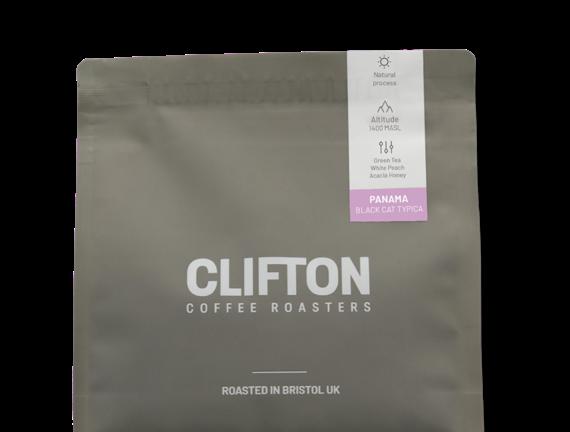
For our decaf specifically we use a Colombian sugar cane decaf. It uses a biproduct of fermented and spent sugar cane in its processing, along with ethyl acetate, which is almost like a vinegary substance that is produced when fermenting vegetables and fruit. This strips the caffeine out of the coffee, and it’s all done in the country of production, so in Colombia there are two large plants that do the decaffeination process in this way. It’s all done at origin; it’s not shipped around the world to be decaffeinated in other countries.
There’s lots of other processes – processes like sparkling water –that are all chemical decaffeination done elsewhere that then has a shipping impact to that country.

Our decaf is processed in Colombia then shipped to the UK.
LT: The BCorp status is huge –congratulations! What does that mean for Clifton Coffee?
PG: It’s a real measure of how we’ve been working already and making ourselves slightly more organised as a business by putting that sustainable hat on with every decision we make. When we have our board or leadership meetings it’s a big focus within the business, for little or large decisions.
If we’re changing packaging, investing in new equipment, discussing companies we want to do collaborations with, even down to the material that we get our merchandise printed on or the ink that gets used, all these inputs within our business we’ve got our sustainability hat on when we’re thinking about these things.
LT: Clifton has a huge focus on seasonal and special products. What is your approach to developing a new coffee blend?

PG: It’s very easy in today’s coffee buying world – from my perspective within raw, unroasted green coffee buying – to over-buy and overcommit to some coffees and then they sit around for a little too long. Coffee is extremely seasonal, and it should be thought about in that way. I try and minimise too little and often, especially on our higher end, smaller lines like some of our African coffees. Because it’s seasonal, it should only be available for a couple of months of the year and is more exclusive, get it whilst it’s at its best!
The coffees that you can buy all year from us, we buy those types of coffees because they hold up really well for that year and we buy them on an annual basis when the fresh crop arrives. I try and get in as early as possible with the importers that we work with and get a taster and samples of beans that are about to arrive. I have a detailed calendar of when product should arrive so I’m hot on my emails and calls to try and get this stock as quickly as possible. It’s very easy to miss out on this stuff!
I think we should treat coffee like we treat other produce. It should be seen as more seasonal, and it changes every year kind of like wine growing years. It is honestly
LT: In terms of trends, what do you see emerging in the coffee industry?
PG: We’ve definitely seen some big shifts in recent years in terms of pricing. Coming out of Covid, people wanted to spend lots on coffee, then there was a dip and people not wanting to spend. Generally, I think there’s a demand for much higher end stuff than we originally thought.
We have a range called Unparalleled Series which is quite a key line for us. It’s the best you can buy in the world, showcasing the most unbelievable coffees that are usually produced on tiny scales, and really showing what high end speciality coffee is all about.

Expertise in growing, expertise in drying and processing, and us roasting it the best possible way to really show off its complexity. That has been popular for us, people are geeking out on coffee! I honestly think it’s down to things like Instagram reels and Tiktok, seeing people with these incredible home coffee set ups.
The detail and the level of wanting to buy high-end coffees is crazy and the accessibility to it now is pretty

LT: So, do you have a favourite Clifton Coffee blend that would stand out for you personally?
PG: Yes! I’m going to break it down to two things. So, if it’s espresso I love our E1 product espresso which is from El Salvador, it’s from the producer I mentioned earlier. It’s one of my early Clifton memories really, I used to go to local cafes, and I’d see it on the menu, and I’d have it.

It’s one of those coffees that my mum would have as a latte and love it, and I would have as an espresso and love it. It’s this great balance between being a gateway to specialty coffee but it has enough acidity and fruitiness that ticks the box with a more seasonal coffee person. And then for filter, we’re about to release (well I’ve been drinking it for a while), an amazing coffee from Peru from a producer called Wilder Garcia, and he produces these really high-end micro-lot coffees and it’s absolutely incredible.
You’d think it tastes like a coffee from Africa, from Kenya or something. It’s completely different to your usual Peruvian taste profile, that’s my favourite filter coffee at the moment.
LT: We’ll look out for that one! And then finally, what’s next for Clifton Coffee Roasters?

PG: For us right now, we’ve had lots of amazing growth over recent years and it’s about us thinking about how we manage that growth and where do we cap it, because we could keep growing and growing, which is a really great problem to have, but it’s how we grow ourselves into the next steps of business.
We’re at over 45 members of staff now which is crazy, back when I started, I think I was number 12 or 13, it’s really grown quickly! It’s about us gearing up for the next five years and our scalability, and that planning is starting to happen earlier and earlier. We’re thinking where we are going to be in three, five, ten years’ time much earlier than we thought. And thinking about how we can grow our reach into our direct relationships. I really want to develop further purchasing within Africa.
We buy from a washing station in Ethiopia but not the scale I would like there, so hopefully develop some things in other countries and other regions.

LT: It sounds like there’s a lot to work on but also so much progress already been made!
PG: Definitely. It’s been an incredible journey – I’ve been here seven years now and lots of stuff has changed in terms of our scale and how we’ve moved with the market.
Want to learn more about coffee and the latest trends surrounding everyones favourite morning beverage?
click here...
I think we’re in an incredible place right now in terms of specialty coffee as the UK is really booming at the moment, and it’s how we can maintain quality and keep moving forward and not stagnate. That’s a big thing in coffee, it’s almost like the tech industry; you can’t stand still it’s always got to be moving forward.
LT: And do you find there’s a lot of competition?
PG: It depends, it really depends. There’s lots of roasters now, but in terms of roasters that are doing everything that we’re doing, not necessarily at all.
There are probably single figures of other roasters in the UK and in Europe that really do the full breadth of what we do. And they may say they do it, but they may not actually be able to deliver that. And I truly think that we’re able to deliver our promises and stick to those key principles that we built the business on.
If you would like to learn more about Clifton Coffee roasters, or stay up to date with on a daily basis, why not drop them a follow on instagram or check out their blog page...

Click here to learn more about Clifton Coffee Roasters

Click here to follow Clifton Coffee Roasters daily

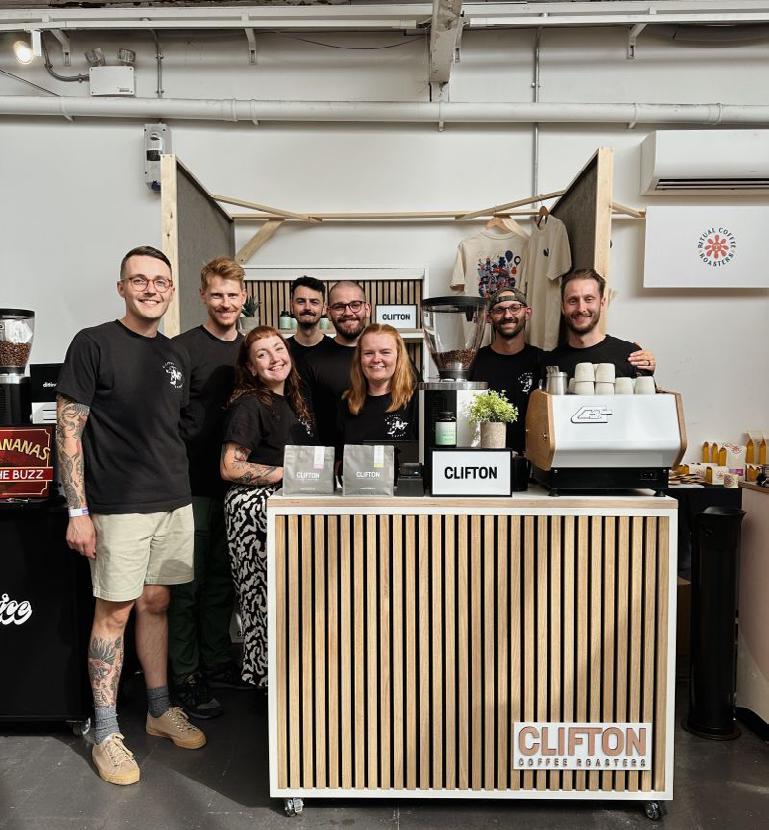
In the latest annual assessment, allmanhall has been recognised by EcoVadis as a ‘Gold Rated’ supplier…
Mike Meek, allmanhall’s Procurement & Sustainability Director had an announcement to make.
”I’m really pleased to advise that following our annual sustainability assessment, Ecovadis have rated allmanhall as ’Gold rated’.
This international rating system which covers ethics, sustainability and governance puts allmanhall on the 94th percentile of global businesses assessed.”
Read the full blog here:
https://allmanhall.co.uk/blog/allmanhall-become-an-ecovadis-gold-ratedsupplier
Find out more about our sustainable supply here: https://allmanhall.co.uk/sustainability
 Mike Meek Procurement and Sustainability Director
Mike Meek Procurement and Sustainability Director

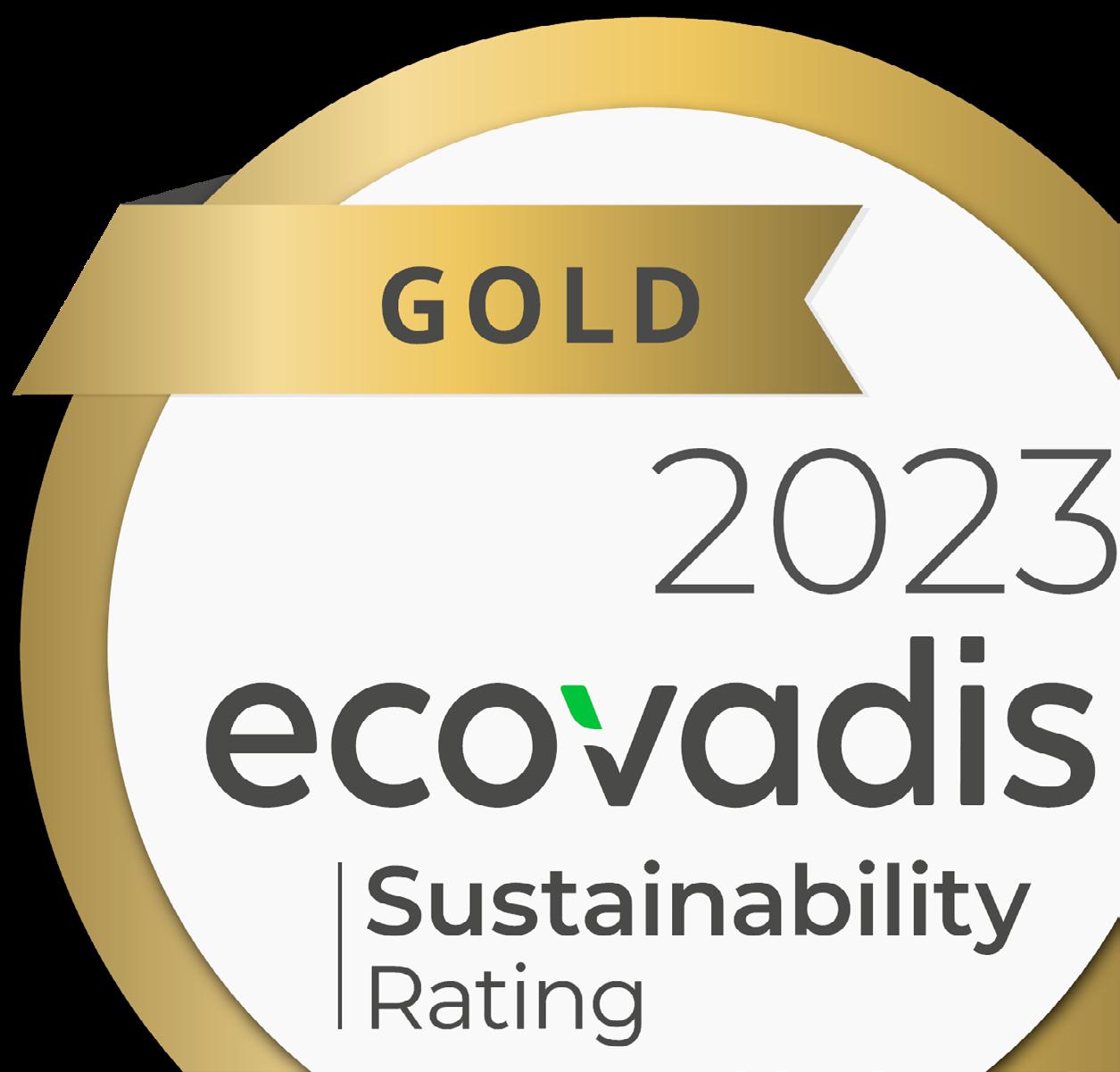
Add up to 5 recipes or food items for FREE and see the carbon impact data, instantly!*
Foodsteps is so easy to use and great for communicating and understanding carbon impact assessments of your food.
Together, you and your diners can make a difference.


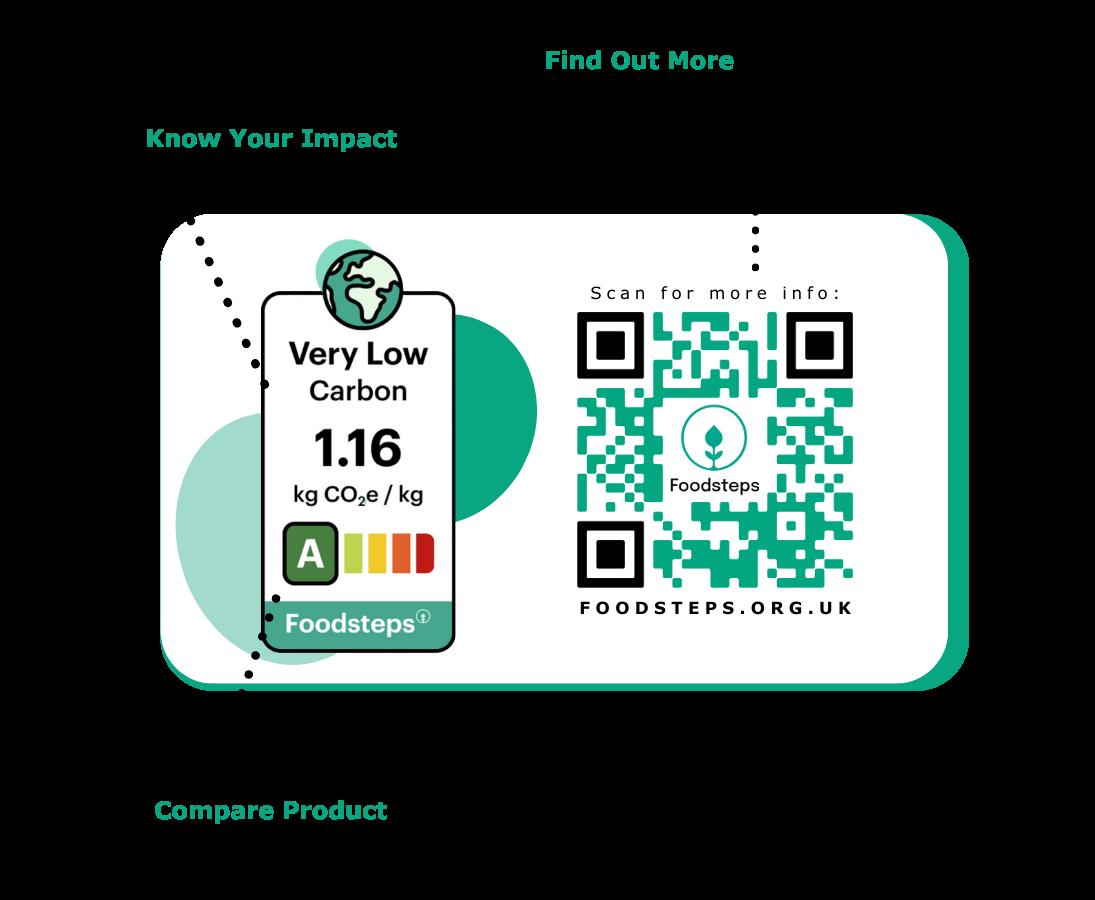
If you like what you see, simply ask allmanhall for advice about the best option for you and how to access competitive rates.

Scan to sign up for your FREE 5 recipe trial today!

As part of their ongoing mission to bring clarity to food-related emissions, Foodsteps have recently added packaging analytics and emissions to the platform.

You can now add the packaging you're using, for example, the boxes used to store prepared foods. This carbon impact will be assessed and added to the recipe. This covers a wide range of packaging options and the components on the platform can be edited to fit your unique packaging usages and then added to every recipe that is relevant.
This provides further accuracy when bringing transparency to menu choices, and is another invaluable area of focus when looking for ways to decarbonise your menus.
Foodsteps will help your business educate and inspire your customers throughout their sustainable food journey with carbon rating labels...

The global food supply chain is a complex network of farms, factories, and storage facilities to transform raw agricultural goods into consumable products. This vast network shoulders the responsibility of meeting the demands of consumers worldwide. Any disruption within this intricate system can significantly reduce availability and increase costs, impacting producers and consumers.
Manufacturers and producers within this supply chain face a formidable challenge:
To produce sufficient food to meet demand while maintaining affordability for consumers. Suppliers such as Bidfood are managing in excess of 10,000 SKUs for over 40,000 customers. In order to manage such a high number of SKUs many adopt the Just-In-Time (JIT) inventory management approach, a method aimed at ensuring optimal production levels with minimal inventory on hand, thus reducing costs and waste.
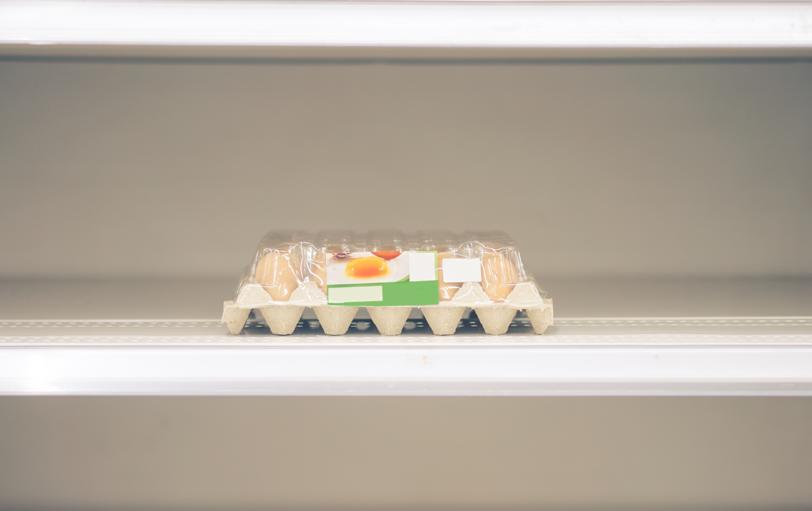
While JIT has proven to be a successful model in driving down costs and waste, its vulnerabilities become apparent in times of supply chain shortages and sudden demand changes.
Shortages in the food supply chain can stem from a myriad of factors:
Weather: induced raw material shortages, such as the current potato scarcity in the UK due to excessive rain impeding harvesting, are a prevalent concern and out of the control of producers.
Production challenges: including machinery malfunctions and labour shortages, can significantly disrupt the supply chain. For instance, the 2014 factory fire at McVities halted production, which caused consumers to switch to alternative products. Manufacturers of these alternative products then struggled to fulfil demand causing market-wide shortages.
Price fluctuations: can cause certain products to become economically unviable, resulting in their exclusion from supply chains. The recent rapid surge in Olive Oil prices has spurred consumers and manufacturers to explore alternatives. Among these substitutes is Mellow Yellow, a British-produced rapeseed oil produced on Farrington’s Family Farm.
The escalating prices of raw materials often trigger heightened demand for lower-cost alternatives, posing challenges in forecasting. Notably, the increasing demand from catering operations for pasta, a budget-friendly option, has contributed significantly to its scarcity in the market as manufacturers struggle to secure additional raw materials and resources required to increase production.
Logistical disruptions: can reverberate globally, exemplified by the redirection of shipments around South Africa from the Red Sea due to the actions of Houthi rebels.
This redirection, elongated transit times, and had repercussions on the availability of all goods which travel through the Red Sea, 12% of the world’s seaborne trade.
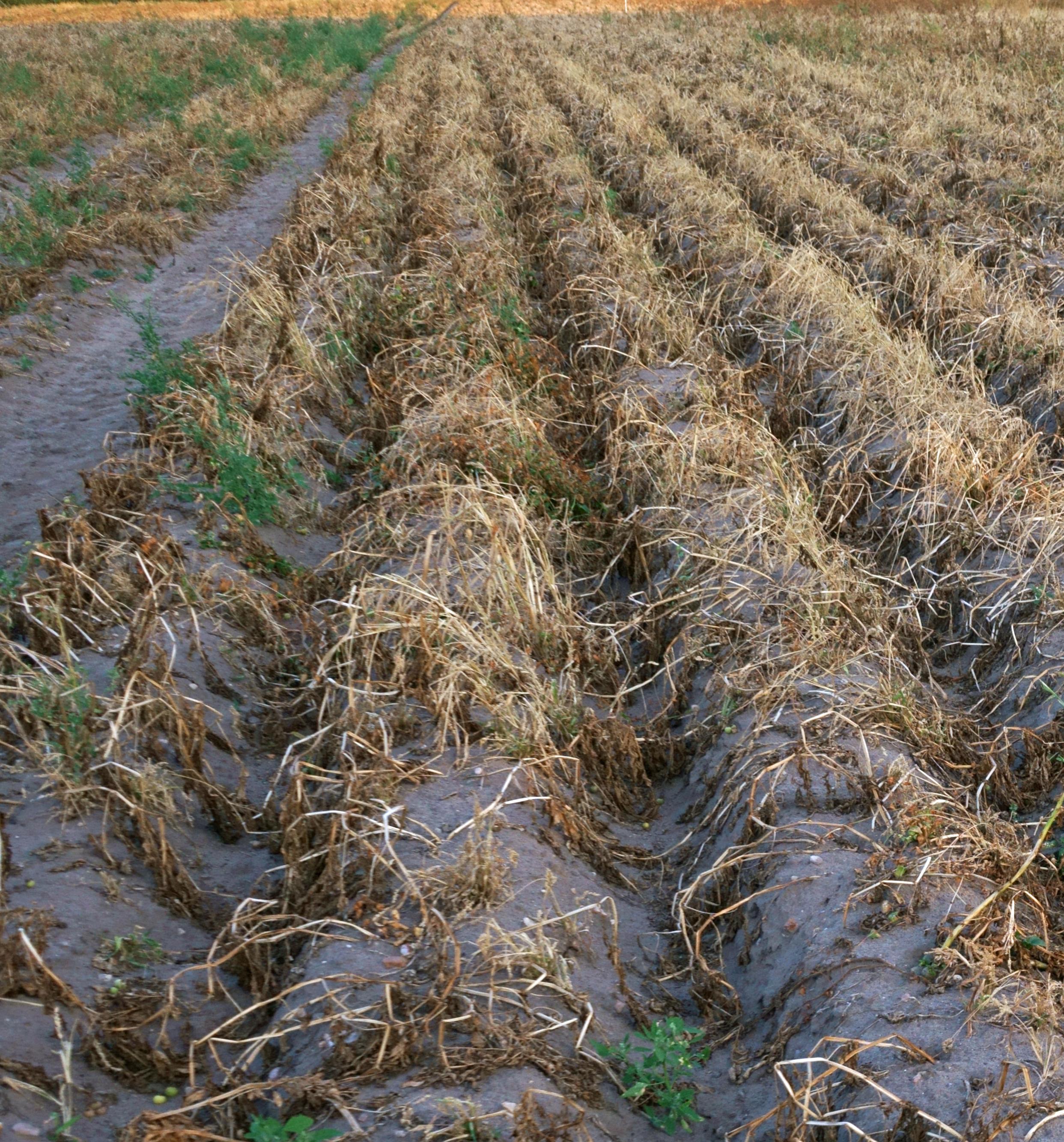
Foodsight: Summer Edition 2024
The price of goods was also affected as production lines had to reduce their outputs due to the shortages, this had a large impact on profits and consequently prices.
Sickness and diseases among staff members further exacerbate production and transportation issues, while crop diseases have the potential to decimate entire yields, leading to substantial shortages. In the face of these challenges, foodservice and catering teams must ensure proactive management of their supply chains to mitigate risks.

Collaboration with suppliers to forecast operational needs and implement strategies for adapting to potential shortages is imperative.
This includes considering viable substitutions in menu planning and ensuring flexibility to accommodate fluctuations in availability.
As a food procurement expert, allmanhall has a team dedicated to help caterers identify potential challenges within their supply chain and mitigate risks.
At allmanhall, we regularly undertake independent third-party benchmarking of our pricing.
The latest analysis shows we have increased our competitiveness against the marketplace by over 10%.
This is despite food inflation running at nearly 5% for the year to Feb 2024. allmanhall are consistently demonstrating our ability to outperform inflation and deliver continued benefit to our clients and customers, across the country.


 Author Martin Little Finance & Systems Director
Author Martin Little Finance & Systems Director

Summer Edition 2024
Foodsight: Summer Edition 2024
Summary of our annual ESG report, by Theo Kuehn, Sustainability Manager at allmanhall.
At allmanhall we put sustainability, transparent operations, measurable and real impact, at the heart of what we do for our clients and working with our suppliers. Each year, we undertake an Environmental, Social and Governance report.

In support of our commitment to make our operations more transparent, here are some figures and highlights from our upcoming Environmental, Social and Governance annual report, which covers all 2023 activity. We hold a fundamental belief that good food really shouldn't cost the Earth. And we recognise the importance of measuring and disclosing key figures, crucial as part of developing greater transparency in our value chain.
allmanhall is a growing and thriving organisation, welcoming new clients almost weekly and continuing to support current clients.
• This has contributed to revenue growth of 37% between 2022 and 2023.
• Our team grew by 22% in the same time (headcount, FTE)
• This growth has led to a 15% increase in our direct scope 1 and 2 emissions.
• We have transitioned our company car fleet to 100% electric vehicles.
• We measure our carbon intensity by tCO2e per million £ turnover.
Despite our growth, this has decreased by 6% from 1020 tCo2e per million £ in 2022 to 953 tCO2e per million £ in 2023. This is shown in the table below.

Total company carbon emissions increased by 28% from 31,915.7 tCO2e in 2022 to 40,985.21 tCO2e in 2023 (note: revenue growth was 37% so the emissions increase is substantially less, hence the net reduction in our carbon intensity). This is illustrated in table 2.
• We continue to focus on tackling the most intensive emissions in our value chain, through management of operations and via collaborations. Our exclusive partnership^ with Foodsteps is crucial, as we extend the availability of this carbon impact assessment platform into more clients, enabling them to calculate and reduce the intensity of their recipes.
• We have reduced spend-based emissions calculations, as we focus on improving the accuracy of their results. A 4% increase of supplied weight being covered by volumetric calculations has been achieved.

• In 2023, we embarked on aligning with the Science Based Targets initiative, publicly committing to a 42% reduction in scope 1 and 2 emissions by 2030, with a long-term goal of achieving net-zero emissions by 2045. Our full decarbonisation strategy is outlined in the full ESG report, to be published once available, on our website.




^ Exclusive to Independent Education, In-House Catering. Also available to other sector clients via allmanhall with competitive rates and extra support offered.

• 99.98% of our emissions are a result of the supply of our client’s product choices. As a supply chain management provider, our greatest impact on the planet will therefore come about through collaboration with clients, suppliers and manufacturers, through the value chain, to enable and encourage a transition to lower impact product choices.
• Collaborating with suppliers to help map the value chain, to analyse environmental, social and financial impacts, with a special attention paid to high risk and high impact commodities.
• Requiring all core suppliers to undergo an Ecovadis audit (ESG audit tool) covering environmental and social performance metrics. Currently, 75% of our core suppliers are now part of these Ecovadis audits and the aim is to make this 100% within a matter of months.
• Providing sustainability dashboards as part of the support and insight provided to our clients, to educate on the societal and environmental impacts of product choices, advocating for sustainable alternatives.
• Identifying, promoting, and collaborating with innovative suppliers and their products. For example, Wildfarmed flour and Rubies in the Rubble condiments, who have a commitment to their social and environmental impacts.
• Investing in extending our exclusive^ partnership with Foodsteps, to assist clients in mapping and reducing the carbon intensity of their menus and to inspire through Hero Dish recipes.
• Joining the United Nations Global Compact and releasing an annual communication on progress, as an ongoing responsibility to measure and to monitor our efforts, transparently.
In 2023, our team charitable activities raised around £3,500 through fundraising events like the Bath Half Marathon, benefiting Jamie’s Farm, our primary chosen charity. Jamie’s Farm provides transformative encounters for children through hands-on farm experiences.
• We are working with Forest Green Rovers to deliver Community Cook Along events in the local area. You can read more in the partners section of our website.
• allmanhall achieved the Investors in People Gold Accreditation, placing us among the top 26% of businesses holding this esteemed recognition, underscoring our commitment to being an exceptional workplace.
For a comprehensive overview of our impacts, initiatives, and future aspirations, we invite you to explore the complete ESG report upon its release (June 2024) on the allmanhall website.
Here you’ll find a selection of case studies, across a range of sectors, evidencing real solutions and results which have benefited our clients…

 Authors: Chris Webster Senior Relationship Manager
Authors: Chris Webster Senior Relationship Manager
 Rachael Venditti RNutr. Development Manager
Rachael Venditti RNutr. Development Manager
 Katrina Lane Senior Relationship Manager
Katrina Lane Senior Relationship Manager
“We made the right decision to move to allmanhall or we’d be trying to negotiate it all ourselves...”
In 2021, St Martins Care engaged allmanhall to provide a solution for their food procurement and identify deliverable cost savings without compromising on quality, improve the service of suppliers and eliminate the burden of administrative tasks through a central billing solution.


allmanhall managed a fully supported mobilisation in January 2022, and we have continued to deliver financial and administrative savings to St Martin’s Care for over 2 years now.

Background
St Martins Care is a care group of 6 Care Homes located in the Northeast of England. They have a passion for providing the best possible care for all of their residents. St Martin’s Care’s partnership with allmanhall provides an expert food procurement solution for their Care Home Group which are the home to over 400 residents caring for between 60 and 120 residents at each Home.
Each of St Martin’s Care Homes offer residents home cooked, balanced, nutritious meals.

St Martins Care required better value through procurement strategies as well as a reduction of administrative time, through a central billing system to avoid processing their 3117 annual catering invoices.
It was essential that any supplier changes did not cause disruption to their sites, so with allmanhall’s dedicated mobilisation team and robust process and experience of change management, the required solution was delivered through regular mobilisation meetings to ensure all activity and integration was successful.
Martins Care’s key objectives were:
• Identify deliverable cost savings
• Central Billing
• Ensure the quality of products is not compromised
• Maintain and improve the service of suppliers
• Ongoing support and expertise

The first benchmark for St Martins Care resulted in an 8.42% saving and since mobilising in January 2022, allmanhall’s team of CIPS qualified procurement experts, has secured better pricing and an improved service from suppliers.
A smooth mobilisation process was achieved through hands on support from our finance, helpdesk, technical, operations and dietetic teams.
Utilising industry-leading catering control software, provided by allmanhall, St Martin’s Care were able to achieve administration efficiencies by consolidating their catering invoices into one monthly invoice per Care Home.
In addition, St Martin’s Care have access to insights, news and updates on inflation, commodities, food trends, nutrition, and legislation, allowing them to make educated decisions and act as changes happen.
“The mobilisation of the new catering suppliers, and the transfer of existing ones to allmanhall was – and continues to be – smoothly managed and supported expertly by the allmanhall team. We are always kept informed throughout the process, and all stakeholders are consulted proactively.
The on-boarding of the Saffron catering controls platform was delivered on time and our team all received robust training and continue to be supported with day-to-day queries. Change can cause some apprehension, however allmanhall’s approach provides my team with reassurance and peace of mind at each stage.”
- Keith Milton, group Chief Executive Officer, St Martins Care

For more detail around the client success story, click here...
 Author Chris Webster Senior Relationship Manager
Author Chris Webster Senior Relationship Manager
Salisbury NHS Foundation Trust are committed to taking a sustainable approach to their catering provision and transitioning to net zero supply chains. This is absolutely aligned to allmanhall’s own approach of delivering sustainable value, enabling the Trust to benefit from a high level of insight, expertise and support to drive real change.


allmanhall have been providing a fully managed procurement service to Salisbury NHS Foundation Trust since July 2023.
The Trust were looking for a proactive and supportive partner and allmanhall have been just that, delivering a tailored solution, based on the key objectives identified during the tender process.

The Trust were keen to implement changes that supported their sustainability journey most effectively. allmanhall understood that for this to take place, it was essential to first understand the starting point. Only then could measurable and deliverable targets be set, and a robust action plan developed.
The Trust are proud to hold the Food for Life Served Here (FfLSH) Bronze award and are now looking to progress to Silver. The FfLSH awards recognise caterers who demonstrate a commitment to climate, nature, and health, by focusing on food that is fresh, local and sustainable.
allmanhall supports clients with their Bronze, Silver and Gold awards.

The results?
Foodsight: Summer Edition 2024
allmanhall have delivered an impressive amount of activity in a short space of time including:
The development of a bespoke sustainability dashboard to track purchasing in key areas such as protein, fish, palm oil, country of origin, Rainforest Alliance, Fairtrade and Red Tractor
Comprehensive ranging advice identifying sustainable alternatives
An in-depth review of *ruminant (beef and lamb) purchasing with suggestions provided to support a reduction
A full menu review identifying opportunities to reduce ruminants, which in turn reduce food costs
To further support ruminant reduction, jackfruit samples have been provided, a Quorn supplier visit arranged and a list of vegan and vegetarian Bidfood options shared Product and cost analysis to identify options to achieve the Sliver FfLSH 5% organic requirement
A demonstration of the recipe carbon assessment platform, Foodsteps, has been delivered. allmanhall partner with Foodsteps to enable our clients to measure and communicate the carbon intensity of their recipes.
*Meat has the highest environmental impacts of any food, with lamb and beef being the worst offenders. This is due to several factors, but primarily through methane production and the impact on land use.
“Salisbury NHS Foundation Trust are extremely proud of the steps we have taken to operate in a more sustainable way across all of our services. A key reason we selected to partner with allmanhall is their proactive and sector leading approach to sustainability. We are delighted with the support that has been provided since July, which is allowing us to make informed decisions on our purchasing and food offer.
It is exciting to see change taking place and we are looking forward to future projects with allmanhall which will ensure a sustainable catering service for the Trust.”
Ian Robinson, Head of Facilities & Sustainability Lead, Salisbury NHS Foundation TrustTo read more case studies, take a look here...
 Author Chris Webster Senior Relationship Manager
Author Chris Webster Senior Relationship Manager

“We thoroughly enjoy attending allmanhall’s catering forums to help build our network and keep on top of legislation.”
In 2022, Royal Russell School were proudly operating with in-house catering, however they decided it was time to review their existing procurement and support arrangements and consider what allmanhall could offer.
Background


Royal Russell School is an independent co-educational day and boarding school based in Croydon, South London. It was founded in 1853 and moved to its current parkland site in Croydon in 1924. The school has enjoyed Royal Patronage from the foundation and from Her Majesty Queen Elizabeth II.
What did the client need?
Knowing there is always room for improvement, and that purchasing food from sustainable sources whilst driving further cost savings can never be underestimated, Royal Russell School’s key objectives were:
• Quality • Price • Allergen support
Systems • Networking
The results
allmanhall demonstrated a 12.23% saving in the first benchmark, enabling the school to start implementing changes very quickly. The team at Royal Russell continues to work hard when it comes to introducing new and innovative ideas. Complacency is not an option for Ed Broderick the Catering & Hospitality Manager, who hails the support received from allmanhall:
“Managing suppliers, contracts and pricing is something we would find challenging to balance alongside all our daily operations, so having the assistance from allmanhall to help negotiate our food costs is priceless. Sustainability is a key focus for us, so we`ve been able to take advantage of allmanhall’s sustainability team to present to our pupils and provide useful insights and reports so that we can continue working hard to inspire our catering teams with innovative new products and concepts. We thoroughly enjoy attending allmanhall’s catering forums to help build our network and keep on top of legislation."


Attending the Bursars’ Conference? See you there!
On Tuesday, April 16th, allmanhall hosted its highly anticipated annual catering forum at Warwick Schools Foundation. School caterers from across the UK were invited to partake in an enriching experience filled with networking opportunities, insightful discussions on industry trends, and tantalising culinary delights to savor.


Guests began arriving at 9am, where they were greeted with a delectable assortment of pastries, fresh fruit, and refreshing juices, setting the perfect backdrop for networking amongst other caterers.


The forum kicked off with an engaging presentation by allmanhall’s Registered Dietitian, Tess Warnes, who delved into the latest advancements in nutrition and dietetics. She illuminated attendees on critical topics such as allergen considerations, navigating the complexities of ultra-processed foods, and emerging trends like Precautionary Allergen Labelling (previoulsy know as ‘may contain’), the distinctions between vegan and free-from labeling, and the significance of Owen’s Law.
Key takeaways:
• Precautionary Allergen Labelling should only be used if there no way to limit risk.
• Vegan and free-from labelling are completely different. Vegan labelling can have ‘may contain’ statements. Free from labelling does not mean the product is free from all allergies. Vegan labelling is not appropriate to be used for those with allergies, vegan labelling is not regulated in the same way as Free From claims.
• Owen’s Law, if made mandatory, will require all restaurants and cafes to list allergens on menus, it is unlikely to affect schools but full details are unknown as of yet.
• Ultra-processed foods are not well defined and need more clarity. For example bread may be considered processed but can form part of a healthy diet.



To learn more about the 14 major food allergens, read this blog: https://allmanhall.co.uk/blog/what-are-the-14-major-food-allergens
Round-Up: Highlights from the recent Forum and key takewaways
Klaire Alexander and Theo Kuehn took the stage to address a pressing concern: the environmental impact of packaging. Their insightful presentation not only shed light on the detrimental effects but also empowered caterers with actionable strategies to minimise their footprint. Attendees also had the opportunity to experience firsthand new and innovative solutions through product sampling.
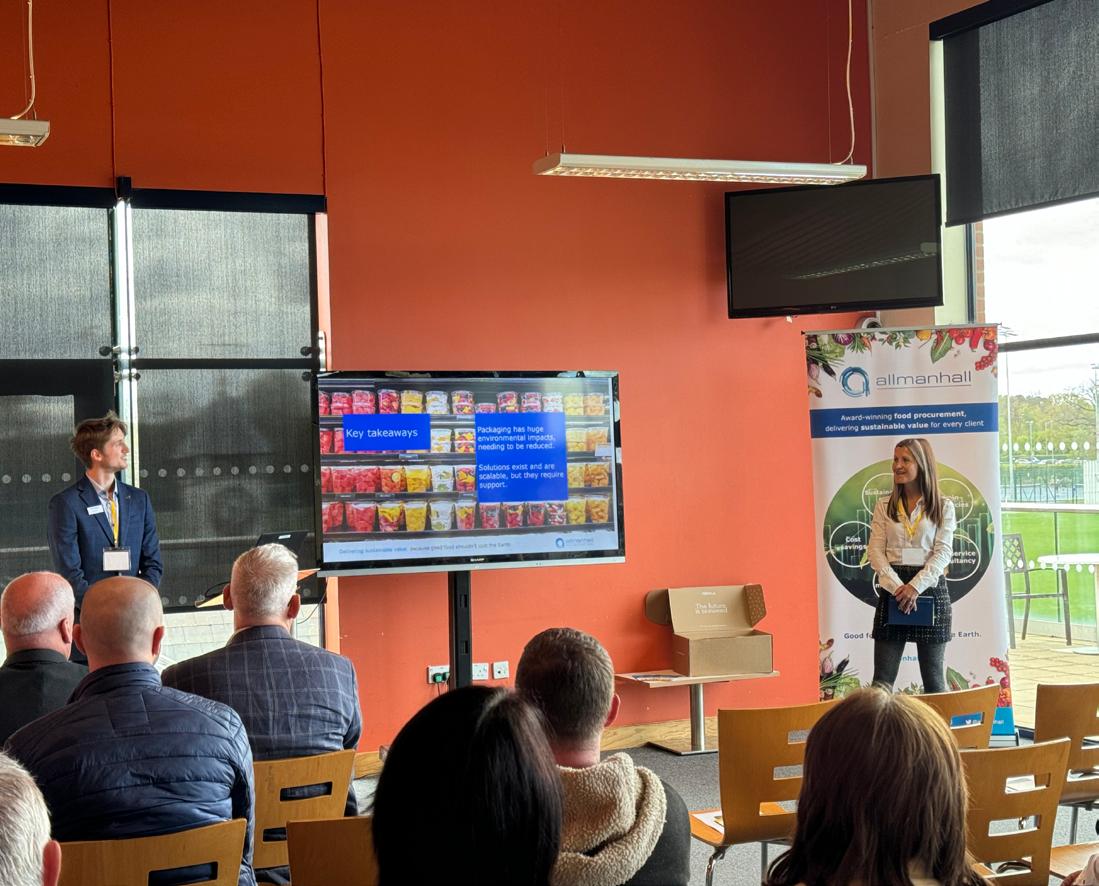



Key takeaways:
• By adopting sustainable circular packaging solutions with accredited recycling schemes we can do much more to protect our planet.
• It’s important for schools to make pupils feel part of positive change and relieve eco-anxiety. Young people are engaged in building a sustainable planet.
Summer Edition 2024
Round-Up: Highlights from the recent Forum and key takewaways
The talented catering team at Warwick Schools Foundation treated guests to a delicious lunch. *Warning* - the photo below will make you feel very hungry!
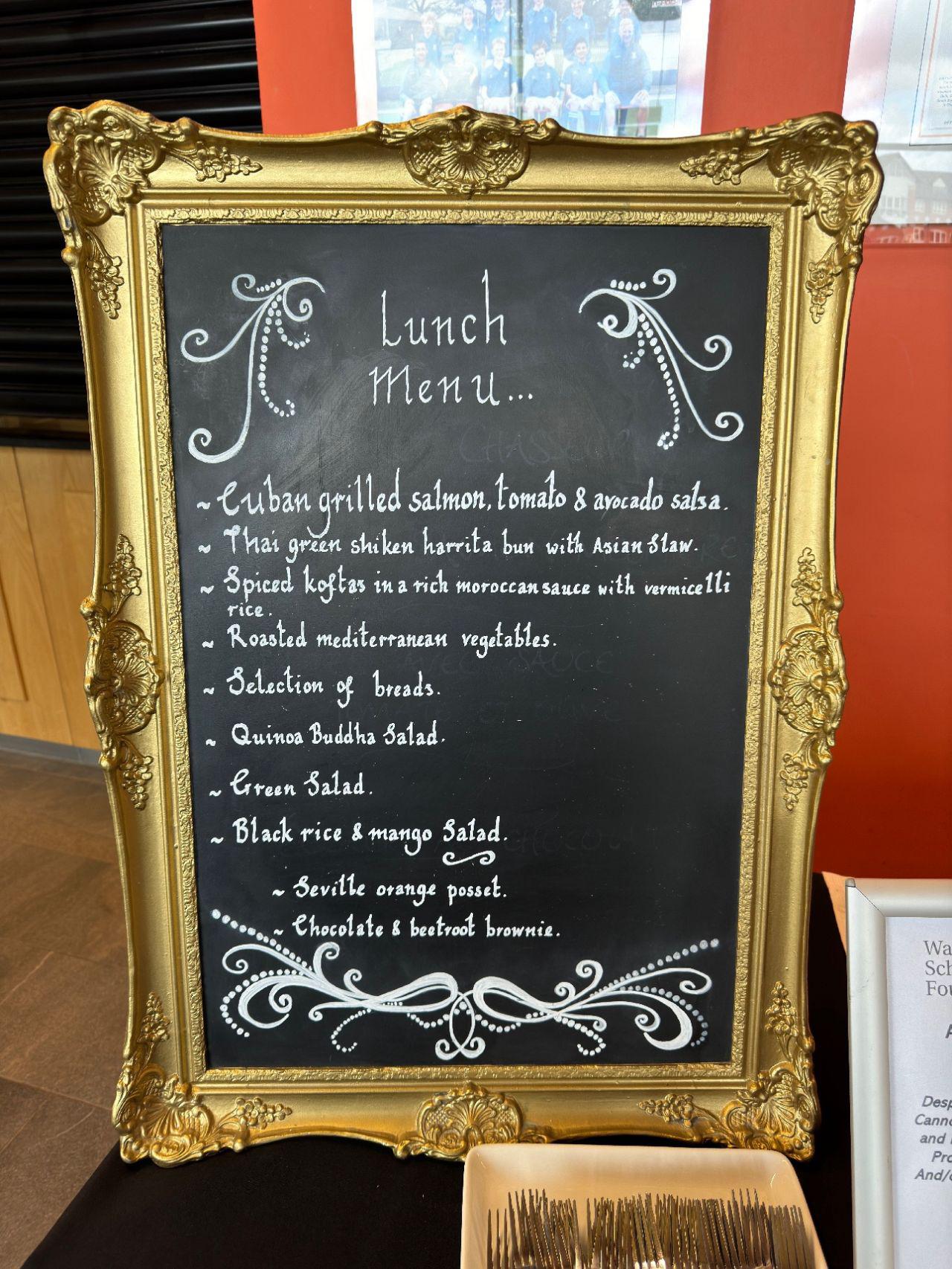
With special thanks to Claire, Bernie and John from Warwick Schools Foundation.
Article continues on the next page
Round-Up: Highlights from the recent Forum and key takewaways
Guests were deeply engaged in discussions surrounding budgeting and food inflation forecasts, a topic of paramount importance. Hayden Hibbert, Client Relationship Director at allmanhall, led an enlightening session where he dissected the macroeconomic factors influencing inflation and price fluctuations. From the impacts of Brexit to geopolitical tensions in regions like Ukraine-Russia and the Middle East, as well as logistical challenges such as Red Sea delays, Hayden provided valuable insights into the complexities at play. Despite recent declines in inflation, he cautioned that sustained decreases might not be immediate.
Hayden’s tips for budgeting:
3 Consider zero-based budgeting
3 Mitigate increased catering costs
3 Invest in great kit
3 Invest in a catering controls platform
3 Review menus regularly
Wrapping up the day’s presentations, Mike Meek, Procurement & Sustainability Director at allmanhall, delved into the ongoing hurdles encountered by food wholesalers, persistent supply chain issues, and actionable coping mechanisms for caterers.
Throughout his discussion, recurring themes surfaced, including challenges spanning the entire supply chain, escalating product shortages, food inflation concerns, and labor shortages.
In response to these challenges, Mike proposed several proactive measures for caterers to consider. These included forecasting future menus, fostering regular collaboration with supply partners, establishing Acceptable Buying Levels (ABLs), implementing stricter stock management protocols, and leveraging bulk purchasing opportunities while avoiding product splits.
Mike emphasised the importance of transparency and availability of information, through supply chains. Ask the team leader at allmanhall for more information on Foodsteps and Ecovadis if you’re interested in achieving greater visibility and accountability...
Round-Up: Highlights from the recent Forum and key takewaways

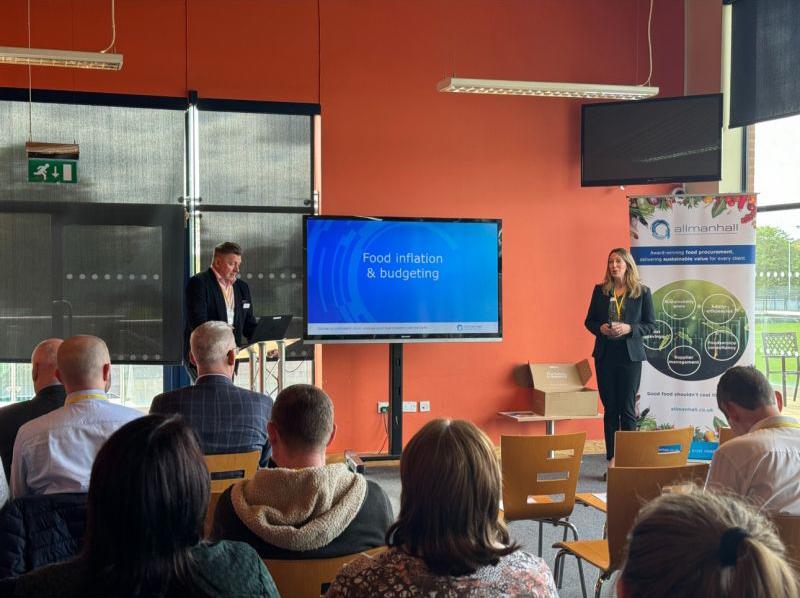

As the forum drew to a close, attendees had the opportunity to savor samples from the Devil’s Kitchen lineup, featuring an array of plant-based burgers, sausages, and meatballs, ideally suited for educational catering settings. Notably, all Devil’s Kitchen products boast sustainability credentials with a minimal carbon footprint and are meticulously crafted to be free from the 14 major food allergens.

Email events@allmanhall.co.uk if you’re interested in coming to future forums. If you work in care, our Development Manager hosts and chairs the NACC SW regional events and would be delighted to welcome you along, or tell you about the NACC Training and Development Forum taking place in October.
events@allmanhall.co.uk for more details...

On Friday 26 April, the team at allmanhall collaborated with Epsom College and Redefine Meat to deliver a lunch service where 800 pupils had the chance to taste trial our new product concept.
 Author Jo Hall Communications & Development Director
Author Jo Hall Communications & Development Director
This has been led by allmanhall’s Procurement and Sustainability Director, Mike Meek and produced in collaboration with Redefine Meat, Wildfarmed, Bidfood, Applewood Vegan and Rubies in the Rubble.

The catering team feedback has been hugely positive about this tasty burger that doesn’t have any compromise:
Incredible taste
Low carbon footprint*
Reduced emissions*
Tackles food waste
Regenerative farming
High in protein
Source of fibre
Comparable cost and value
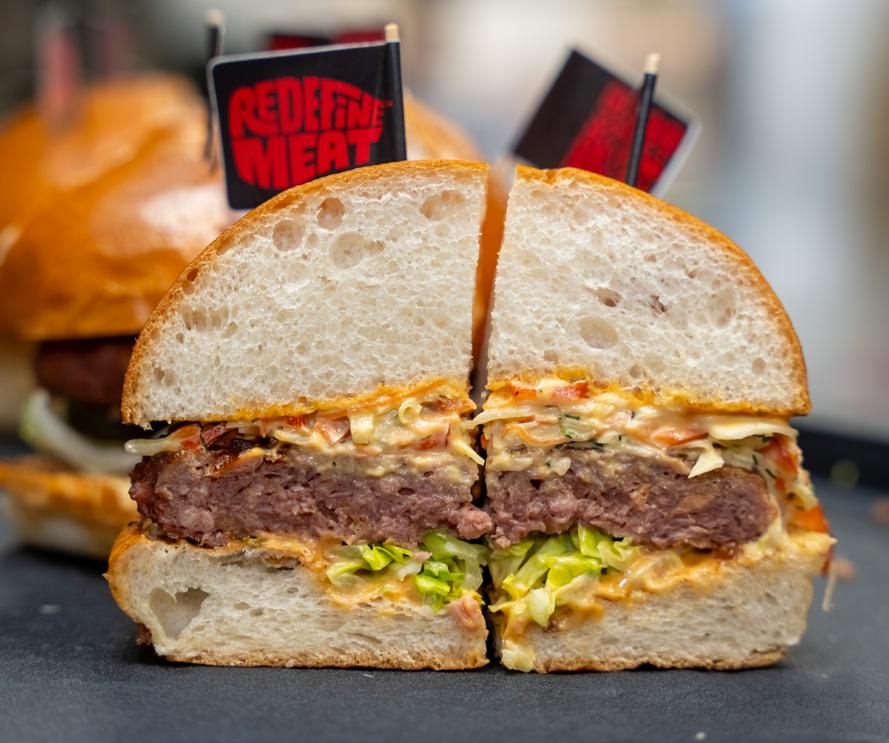
*It’s revolutionary in that it emits only 0.34kg CO2e compared to 5.77kg CO2e from a standard beef burger.
allmanhall’s Dietitian reviewed the burger ahead of the concept approval and summarised its nutritional content as follows:
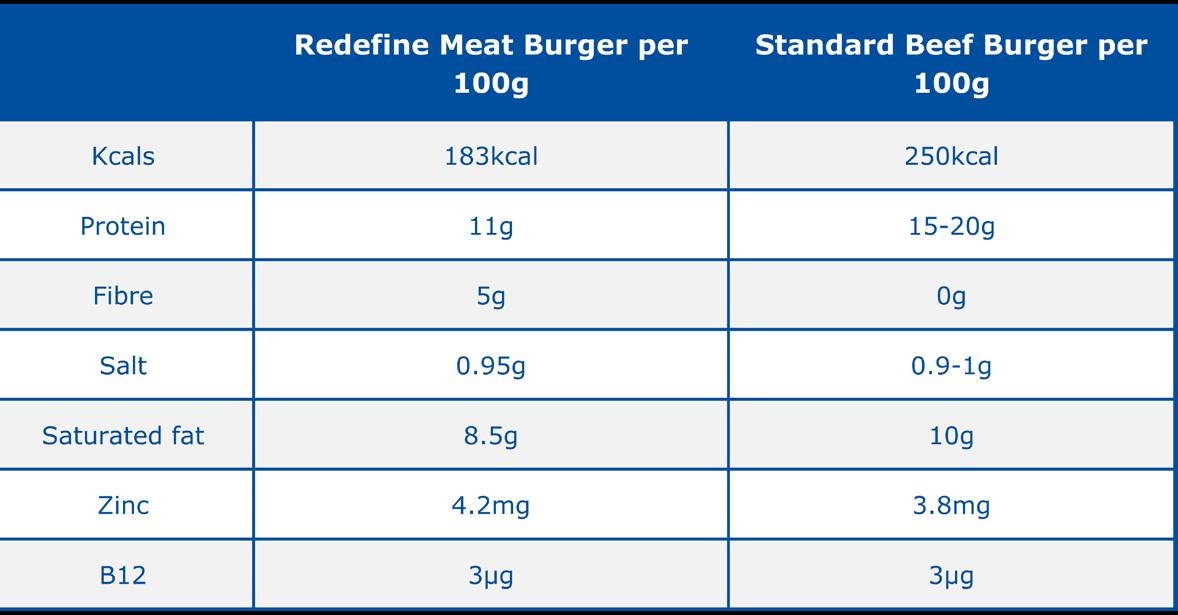
Tess Warnes Dietitian

The day started with a chef demo in the school’s kitchen, delivered by the excellent Daniel Ferreria of Redefine Meat.

Samples were then served - in Vegware eco-catering holders, of course! - to 800 pupils, teachers and staff members.
Epsom College’s Head, Sir Anthony Seldon joined us too.

Rather than bombard the pupils with questions, we have created a feedback form and are collating all their comments – including ideas for the burger’s name! Some did kindly come and let us know their thoughts during lunch service though.
Here we share the experience and feedback of one sixth form student...
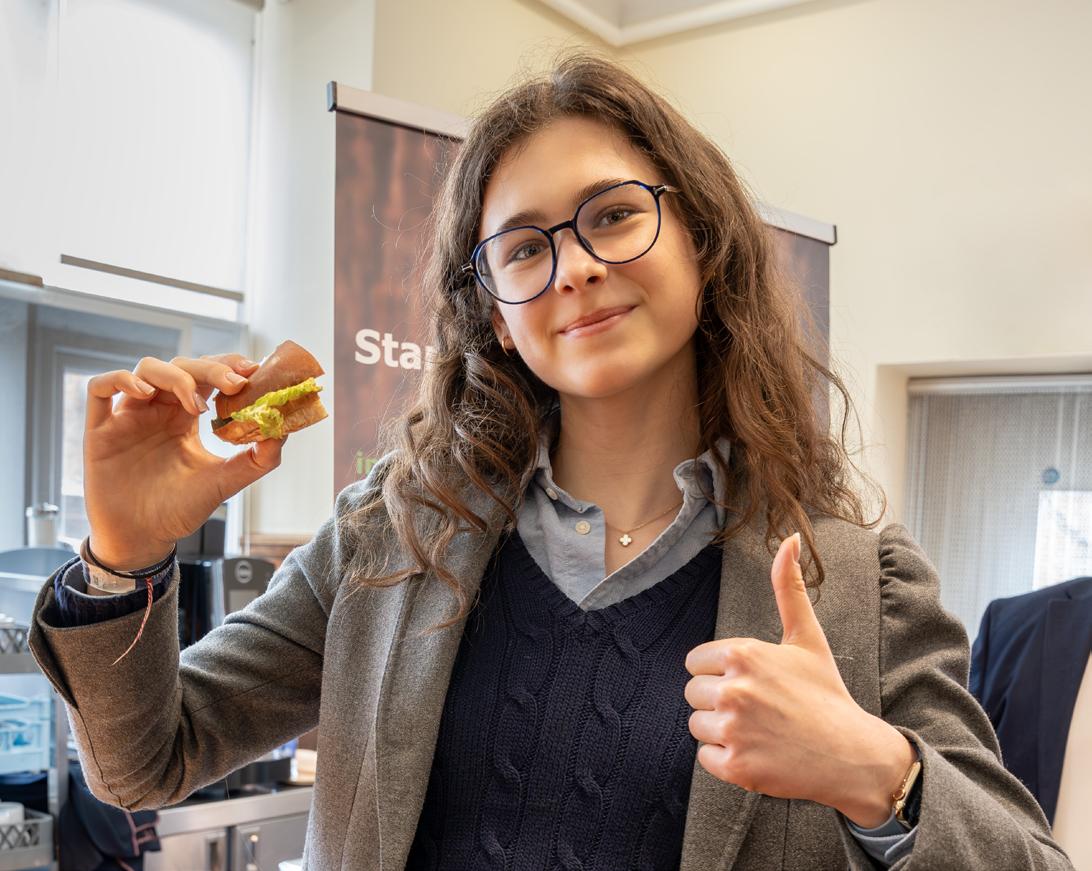
Kalina, aged 17, Epsom College 6th form student:
"It was great, I want more of it! So good."
After lunch, we met with the College’s Climate Committee and heard first hand that their friends were asking if they could get them second helpings and that they couldn’t tell it wasn’t meat or dairy!

"We are continually looking at the ways in which we can become more sustainable and teach our pupils about the food that they eat, where it comes from and the environmental impact of food choices.
This low emissions, waste reducing burger concept from allmanhall is a brilliant initiative and you honestly can't tell it isn't meat. There's no compromise on flavour or taste experience... our pupils and staff really enjoyed it! We knew we were onto a winner when the pupils came back asking for more. Looks like these could be a firm favourite on our menus in the future."
Bev Spencer - Director of Catering Epsom College

The team at allmanhall take a look at whether we should be eating more plant-based meat alternatives, to reduce ruminants in our diet. And then, our Sustainability manager, Theo and Dietitian, Tess go on to explore the complex topic of fish and seafood.
Authors: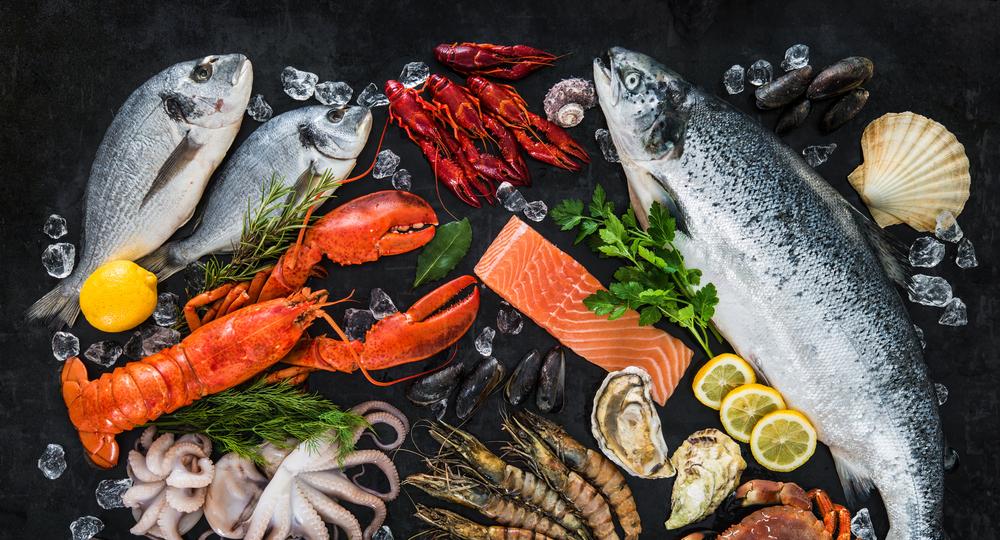 Tess Warnes Dietitian
Tess Warnes Dietitian
 Theo Kuehn
Sustainability Manager
Theo Kuehn
Sustainability Manager

There has been an exponential rise in the demand of plant-based alternatives, and subsequently their development and availability. The number of these products grew by almost 700% between 2015 and 2021, accounting for 12% of launches in 2021.
Let’s break down the options available to look at the topic from the angles of both nutrition and from one of sustainability...
Why the need for plant-based meat alternatives?
From a sustainability perspective, food is 26% of global emissions, with 14% of this is directly related to the production of animal proteins.
According to the Eat Lancet report, to meet the planetary targets of the Paris treaty (1.5 degrees Celsius above preindustrial levels).
we need to limit food-related emissions to less than 1.85kg co2e per Kg of food. When beef can have an impact of almost 100kg co2e per kg produced, it’s clear to reach these targets we need to shift our diets.
On almost all planetary metrics, these alternatives are far more beneficial. Take, for example, this breakdown of a beefbased burger patty vs a Beyond Meat alternative (available from Bidfood).
The Beyond Meat burger is, in our opinion, delicious.
It also uses fewer resources and causes less impact. The choice is seemingly simple!

Are plant-based alternatives a good switch nutritionally?
Including more plant-based foods has been shown to be beneficial for our health.
There is a wide variety to choose from, and they do vary in their nutritional composition.

Key things to know about plant-based alternatives:
• Tend to be higher in fibre due to the natural composition of the food
• Lower in saturated fats
• Some brands are fortified with Iron, B12 (meat is high in these nutrients)
• Some are high in salt. So, best to use plain mycoprotein (Quorn), soya mince/pieces and tofu wherever possible, as these are less processed and lower in salt
• Protein may be lower than the meat equivalent, but most alternatives provide sufficient protein for those eating healthy balanced diets
• Beans and lentils are nutritionally dense, high in protein/ fibre and packed full of other micronutrients
• Try to vary the range of plant-based dishes on the menu
There are now a wide range of plant proteins and brands to choose from. The majority use myoprotein, soya or pea protein.
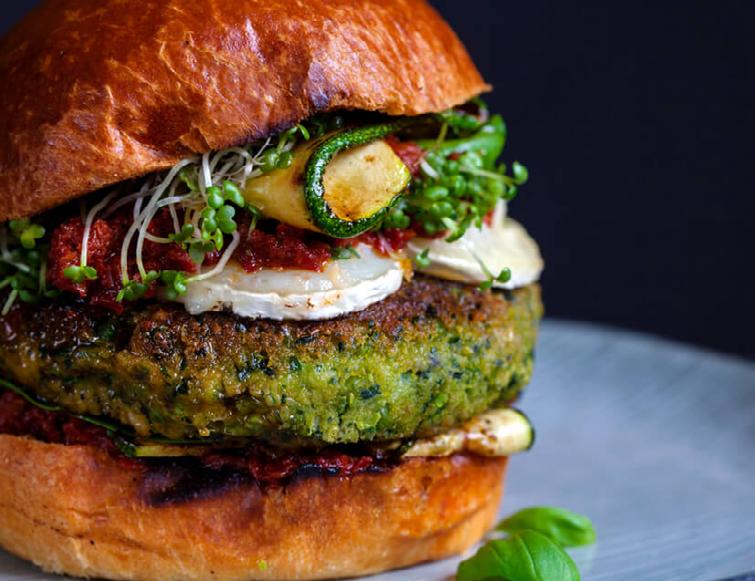
The latter is now used in several products, it is derived and extracted from yellow and green split peas, high in protein and contains other vitamins and minerals, useful for those with soya allergies.
Products using pea protein include Devil’s Kitchen and Beyond Meat.


Pulses such as beans and lentils are a great source of nutrition, and great addition to any meat dish or served on their own, they are also cheap so will help cut down on costs. You may have seen our Procurement and Sustainability Director, Mike Meek shout out to ‘the humble bean’ in his recent ITN interview about positive change in the UK food supply!
If not, you can watch it here...
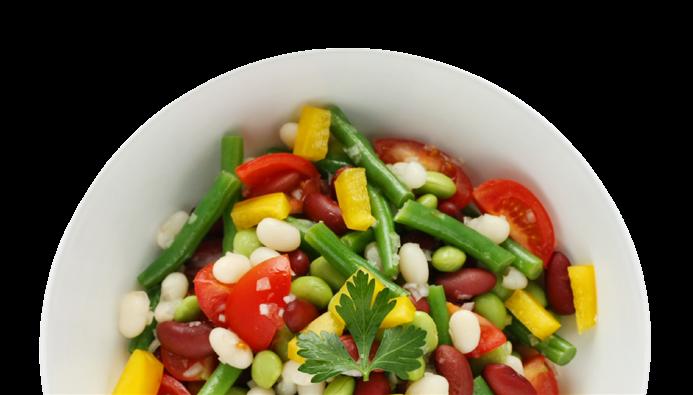
• Measurement and Education: Using innovative platforms like Foodsteps can help measure and educate people on the planetary impacts of meal choices. Find more here, and fore a free 5 recipe trial, do contact allmanhall.
• Positioning of plant-based dishes: A study from Cambridge University found placing plant-based foods first but also with a metre distance from the meat dish increased the uptake by between 25-40%.
• Re-name plant-based dishes: Rather than calling a dish a vegan burger, or vegan curry, name it something that will make it sound as delicious as it is, rather than a compromise or only suitable for vegetarians or vegans.
• Ditch the meat-free phrase: Swap meat-free for another phrase… having a meatfree day is great and proven to lower catering emissions. However, try naming it as something less sacrificial and more engaging like ‘Save the planet Tuesday’. And why does it have to be just one day?!
• Combination dishes: 50/50 recipes are a great way to start, rather than scrapping meat completely from a dish and our experience shows diners are often actually none the wiser! However, do always consider and communicate allergens when amending recipes.

The evidence is clear, we need to reduce our meat intake and switching to more plant-based alternatives is a way to do so.
This raises some questions about fish as a viable alternative to meat. Theo and Tess, our sustainability and nutrition/dietetics experts explore this further…

Is replacing some of the meat in our diets with fish is a sensible and viable option for the planet?
As with the existing production and consumption of a variety of resources and commodities, our current relationship with fish and fishing is detrimental to the planet. For too long, wild fish populations have been damaged by overfishing, leading to several becoming endangered, from Bluefin Tuna to Atlantic Halibut. When populations of these fish collapse, the reverberations can impact livelihoods, nutrition, and ecosystems.
To meet the increased demand caused by growing populations and shifting diets, fish farming has more than doubled since 2007. Farmed fish also typically have a far higher carbon impact, with farmed prawns leading to almost 30kg of co2e per kg of food produced. The best solution to avoid supporting damaging industries is through education and transparency. The Marine Conservations Society’s Good Fish Guide is an up-to-date tracker of impact on the planet, with an easy 1-5 rating guide.
And from a nutrition perspective?
Fish is nutrient dense, packed full of protein and boasts other micronutrients too. Omega 3 fatty acids are one the main attractions of fish, with it being one of the best sources of this essential nutrient, thought to have many health benefits including protecting the heart, helping to maintain good memory and supporting the prevention and treatment of depression.
Fish which are especially high in omega 3 fatty acids include:
- Salmon - Trout - Mackerel
- Herring
- Sardines
- Crab (fresh)
- Whitebait
For much more information about dietetics and nutritional considerations, take a look at this blog.
• Tinned fish is generally cheaper than fresh fish
• …and has a longer shelf life so can reduce wastage too
• Mixing stronger tasting oily fish with white fish can help improve uptake of dishes such as fish pie, fish cakes
• Alternating salmon fish fingers with standard fish fingers on the menu can be a good start
• Trying fish in different dishes such as fish tacos, salmon lasagne, fish curry or a teriyaki fish rice bowl is an exciting option
• Experimenting with a themed seafood day gives the chance to test different taster dishes (to see what’s popular)
• …this can support the education of the benefits of eating fish.
Take a look at the MSC Good Fish Guide!
We have partnered with the world’s greenest football club, Forest Green Rovers,as part of their commitment to making sure that good food doesn’t cost the Earth.
Current food system demands are both adversely impacting and are impacted by global warming in a destructive feedback loop.

To accelerate the transition to food produced in a way that protects biodiversity, our vital eco-systems, and decoupled from fossil fuels.

Ultimately, allmanhall are promoting the use of healthy, nutritious and affordable food and embedding social, environmental and financial value into decision making.

 Mike Meek allmanhall’s Procurement and Sustainability Director
Mike Meek allmanhall’s Procurement and Sustainability Director
Joining forces with Forest Green Rovers, the world’s first and only certified vegan football team, is reinforcing allmanhall in establishing a larger community to generate ideas and innovation for change, including the availability of Devil’s Kitchen products.
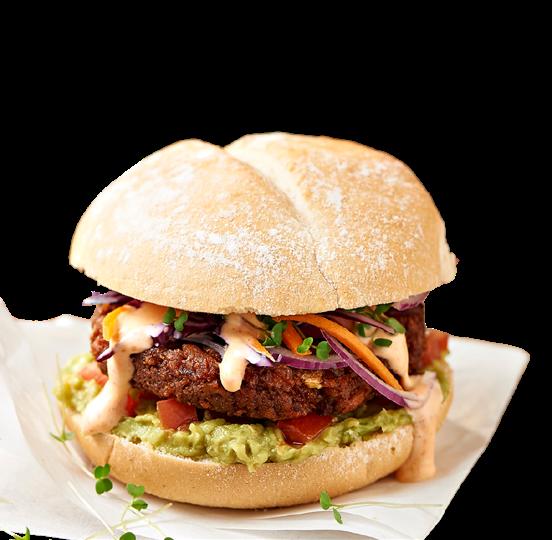

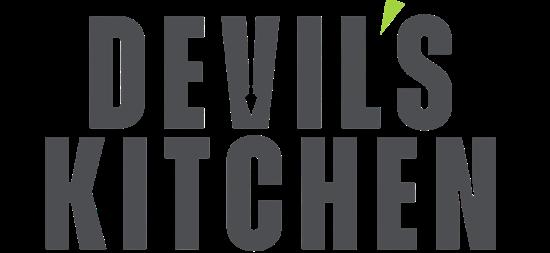

The food supply chain experts are collaborating with innovative food partners to provide essential products to deliver the plant-based food offering enjoyed by the whole Forest Green Rovers community!
As part of the alliance, allmanhall are funding community cooking events with local families to demonstrate affordable, healthy and nutritious recipes. This is in partnership with the Club Community. The first community cooking events took place in March and April 2024 with more to follow!
Education is a key focus for both allmanhall and Forest Green Roversexpect to see many more initiatives in this vein, with a focus on environmental and social value.

Forest Green Rovers have an organic pitch that captures rainwater and recycles it back for irrigation, saving precious water! They also have introduced a new process that cleans up the water from the away fans’ toilets and pumps that back onto the pitch as well!
allmanhall are also sponsoring matches and the team are looking forward to competing in a match at the stadium in May, playing against a number of other partners and suppliers.
The team at allmanhall say “We hope to be scoring actual goals as well as the ones we’re achieving for food sustainability!”
Learn more about our partnership with Forest Green Rovers...




Your guide to new & innovative products, from brands including...
• Notpla
• Devil’s Kitchen
• Rubies in the Rubble
• Fairfields Farm
• Wildfarmed Flour
• Moving Mountains
• Quorn Foods
• Vegetarian Express

→Products with this symbol are bespoke and require you to provide a forecast of what you plan to purchase. Please ask the team for details.







RUBBIES VEGAN MAYO CRYOVAC POUCH FOR DISPENSING UNIT 3 X 2.5KG
RUBBIES TOMATO CRYOVAC POUCH FOR DISPENSING UNIT 3 X 3KG



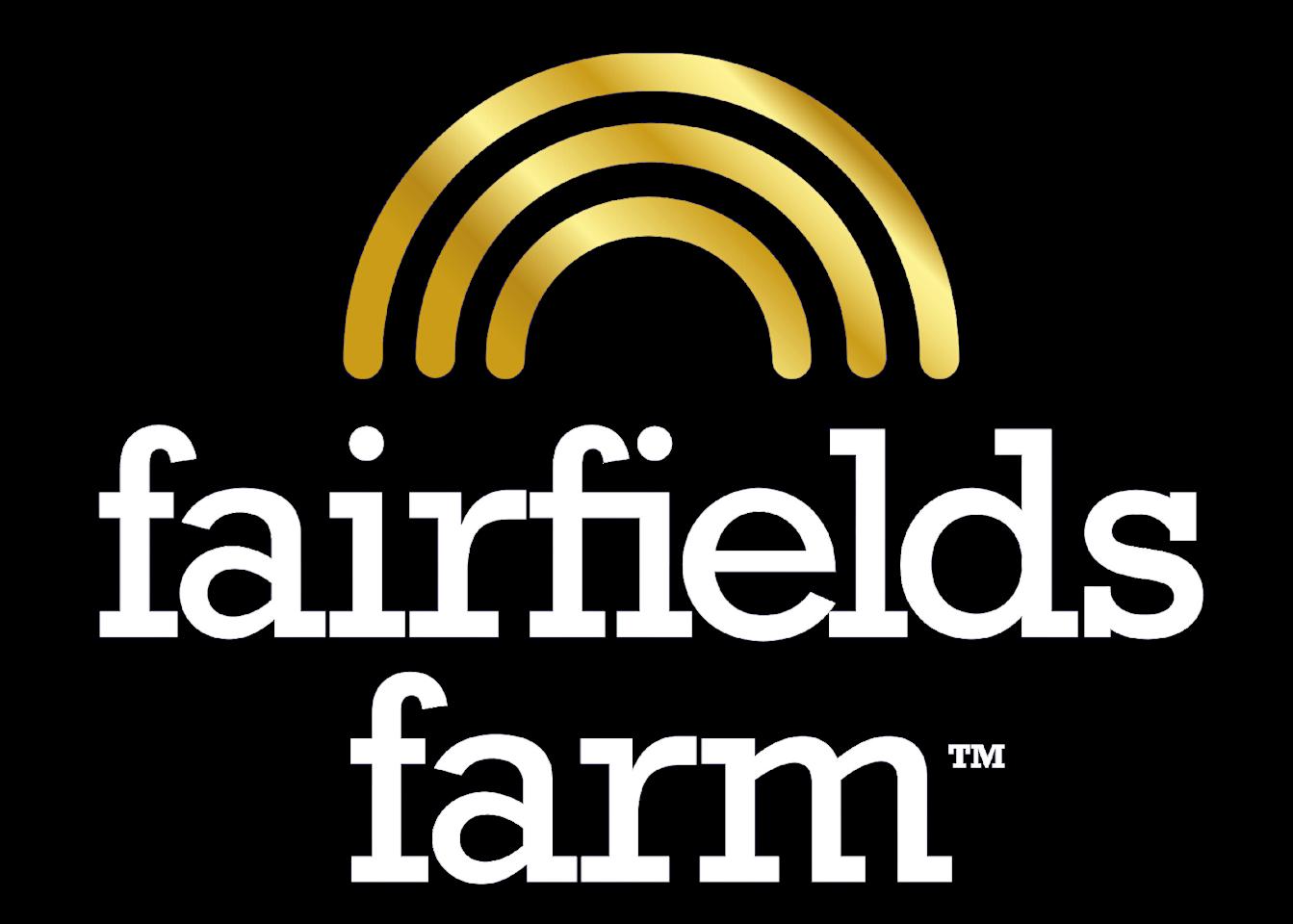
FAIRFIELDS ADNAMS GHOST SHIP PALE ALE CRISPS
FAIRFIELDS SEA SALT & ASPALL CYDER VINEGAR CRISPS
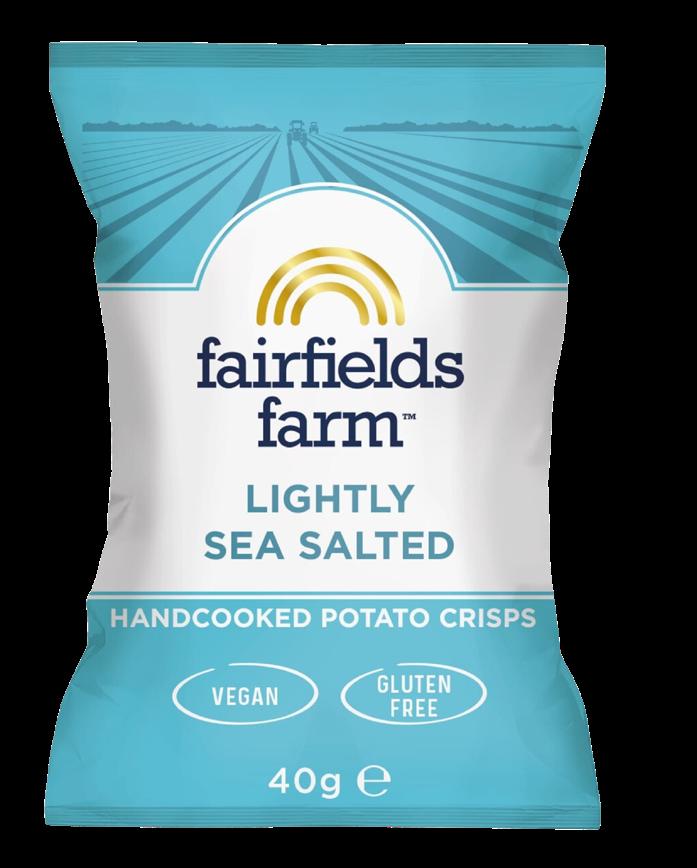

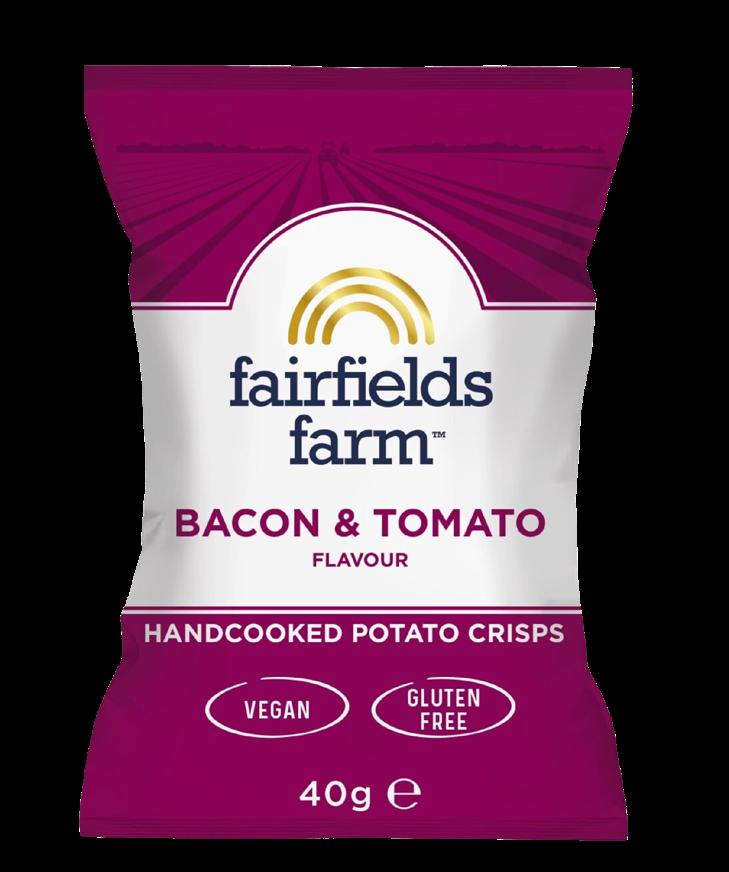



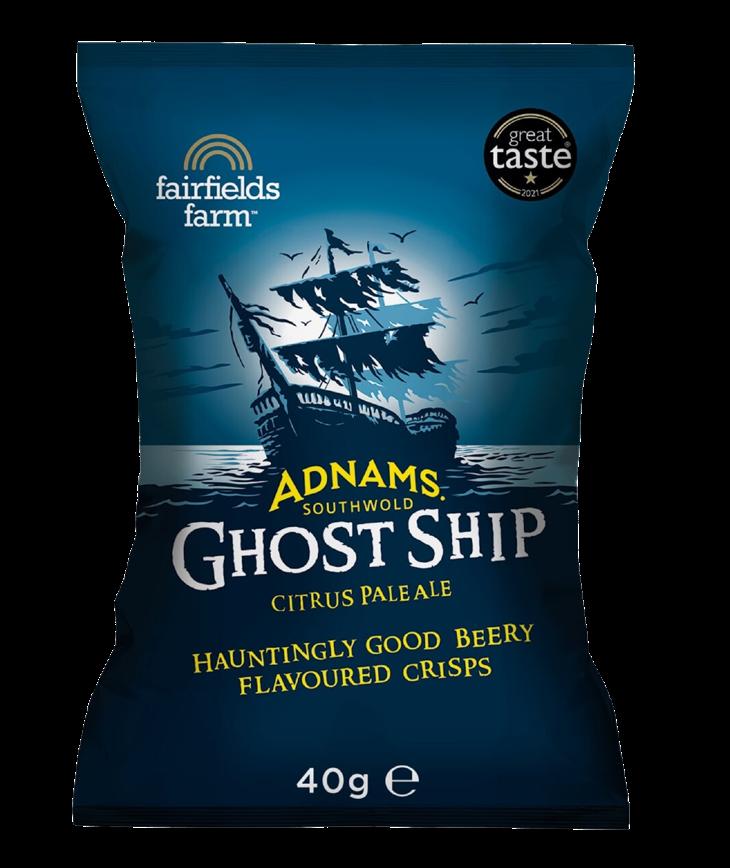















Product code
SOYMIN15K SOY MINCE (V) 15KG
VEGMIN1KG VEGAN MINCE (FROZEN) (V) 1KG
ECURMIN EAT CURIOUS MINCE (FROZEN) (V)
SYMMINCE
SYMSAUSMIN
SYMCHOMIN
ECURHOTP
4 X 500G
SYMPLICITY PLANT-BASED MINCE (V) 2KG
SYMPLICITY PLANT-BASED ITALIAN SAUSAGE MINCE (V) 1KG
SYMPLICITY PLANT-BASED ‘CHORIZO’ MINCE (V) 1KG
EAT CURIOUS HOT & SPICY PIECES (V) (FROZEN)
4 X 500G
ECURBEEFP EAT CURIOUS ORIGINAL PIECES (V) (FROZEN) 4 X 500G
ECURBBQP
EAT CURIOUS BARBECUE PIECES (V) (FROZEN) 4 X 500G


Product code
ROABE
MUSTEA
SYMBALL
SYMLAMINCE
PLANT-BASED ‘BEEF’ ROAST (V) (FROZEN) 2 X 1KG
PLANT-BASED MUSHROOM STEAK (FROZEN) (V) 30 X 80G
SYMPLICITY PLANT-BASED ‘MEATBALL’ (V)
100 X 30G
SYMPLICITY PLANT-BASED CUMIN ‘LAMB’ MINCE (V) 1KG
MOCKL [MOCK] LAMB 1KG (FROZEN) (V) 1KG
BURBEA24X100G SPICY BEAN BURGERS (FROZEN) (V) 24 X 100G
HEUBUR
BURHAM
BURCHOR

HEURA PLANT-BASED BURGERS (FROZEN) (V) 23 X 108G
PLANT-BASED PREMIUM HAMBURGER (FROZEN) (V) 2.4KG
HEURA PLANT-BASED CHORIBURGER (F) (V) (GF) 10 X 110G

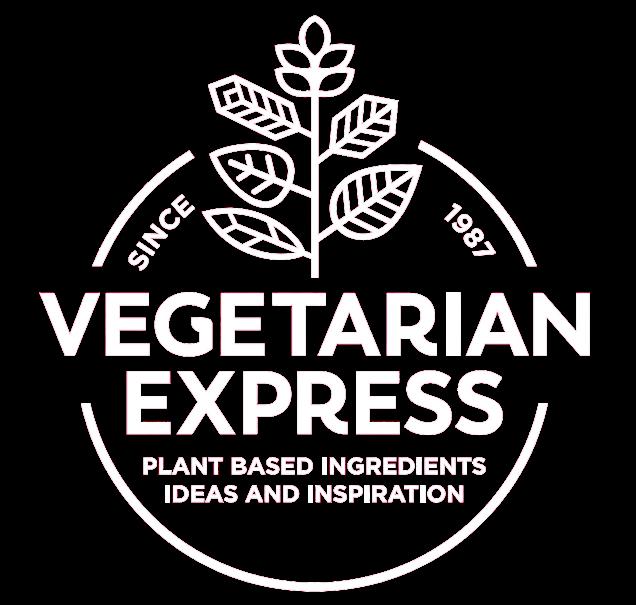
We’re the original plant-based foodies.
We’ve been shouting about how delicious vegan and vegetarian food is since 1987 and no one knows plant-based better than us! We specialise in delivering plant-based ingredients, ideas and inspiration to chefs across the UK.
Our larder is packed with every ingredient and flavour a chef could dream of to help create amazing plant-based dishes... and we’re constantly bringing the latest plantbased innovation to market too. From mind-blowing plant proteins, through to ancient grains, pulses and authentic spices, we’ve got 1200+ plant-based ingredients to offer and that number is growing every day.
Being solely dedicated to plant-based food, we are uniquely placed in Foodservice to help customers capitalise on the astronomical rise in demand of plant-based, vegan, vegetarian and flexitarian dishes.
That’s not all... by purchasing plant-based products, rather than the meat alternative, we can calculate your greenhouse gas emissions savings and provide a personalised annual impact report to see the difference you’ve made.
We understand that environmental impact is not always at the forefront of people’s minds when eating out, but when consumers choose plant-based options it makes a considerable difference. In the past year alone our plant-based ingredients have replaced enough meat and dairy products to have saved 2,463 tonnes of CO2 that would otherwise have been emitted though animal-based food production.
- Jemma Hill, National Account Manager
• 250g MOCK lamb
• 30g coconut oil
• 5g ground cumin
Method | serves 4
• Slice shallots and fry on a low heat with half the coconut oil until cooked.
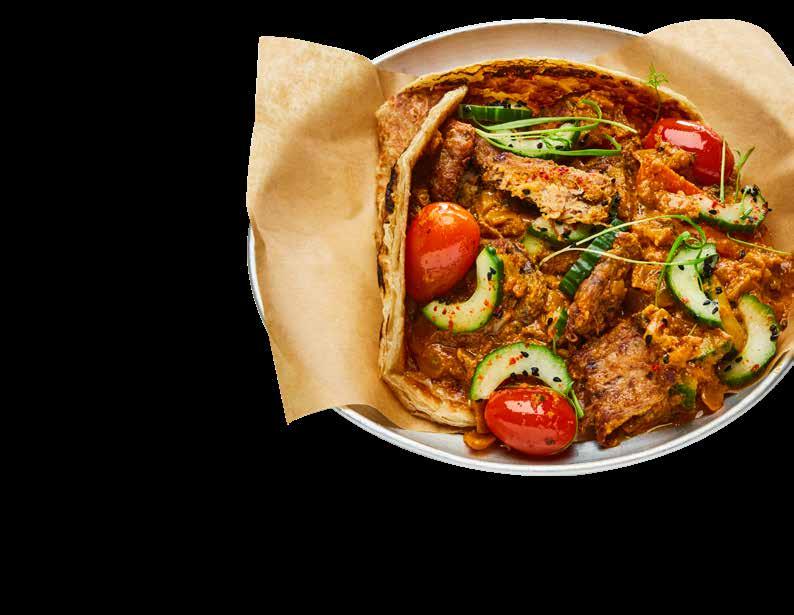
• 5g ground coriander
• 30g Thai red curry paste
• 800ml canned coconut milk
• 2g ground cinnamon
• 40g creamy WOWbutter
• 10g Kikkoman tamari soy sauce
• 10g coconut sugar
• 20g lime juice
• 5g Santa Maria quick NY pickling spice mix
• 2g nigella seeds
• 4 roti paratha 6” flatbreads
• half a cucumber
• 200g baby plum tomatoes
• 100g shallots, peeled
Ground cumin may contain traces of Tree Nuts & Mustard
Coconut sugar may contain traces of Tree Nuts, Peanuts, Milk & Sesame
Nigella seeds may contain traces of Tree Nuts & Mustard
MOCK lamb may contain traces of Peanuts & Sesame
• Add the cumin, coriander, curry paste and cinnamon and fry for 2 minutes.
• In a separate pan heat the remaining coconut oil and pan fry the MOCK lamb until crisp around the edges and coloured.
• When MOCK lamb is cooked add tamari sauce and toss to mix before adding the shallot mix.
• Add coconut milk and 400 ml water and bring to the boil, then reduce to a simmer.
• Add coconut sugar and lime juice to season before adding the tomatoes and WOWbutter.
• Slice the cucumber in half length-ways and remove the seeds with a teaspoon. Finely slice into crescents.
• Sprinkle over the pickling spice and nigella seeds and place in a bag or vacuum sealer to quick pickle.
• Cook the roti from frozen in an oiled frying pan until browned on both sides
• Serve as shown.
Suitable for: Vegan
Allergens: Cereal Gluten, Soya, Sulphur Dioxide / Sulphites
Impact | per serving
Plant based dishes use fewer natural resources in their creation than those made with meat, fish or animal derivatives. Here’s the comparative impact of this dish if it was made using lamb

Ingredients: four servings
• 800g Sweet potato (peeled and cubed)
• 400g Vegetable sausages (try Devils Kitchen sausage - product code 15409)
• 1 Red pepper
• 2 Courgettes
• 1 Granny Smith Apple (peeled & cubed)
1. Preheat the oven to 170°C/338°F.
• 1 Red onion
• 1 Garlic clove
• Honey (3 tbsp)
• Chopped rosemary (2 tbsp)
• Thyme (1 tbsp)
• Black pepper (1 tsp)
• Olive oil (1 tsp)
2. Peel and cube the sweet potato, red onion, red pepper and place them in an oven dish.
3. Coat ingredients with oil, chopped herbs, black pepper and crushed garlic then place in the oven for 15 minutes.
4. Cube the courgette and set aside alongside peeled and cubed apple.
5. After the potato has been cooking for 15 minutes, remove from the oven and add the courgette, apple and honey. Return to the oven for a further 20 minutes.
6. Place sausages in the oven in a seperate dish for 12-16 minutes.
7. Serve the sausages with the roasted potato dish and garnish.

Per serving:
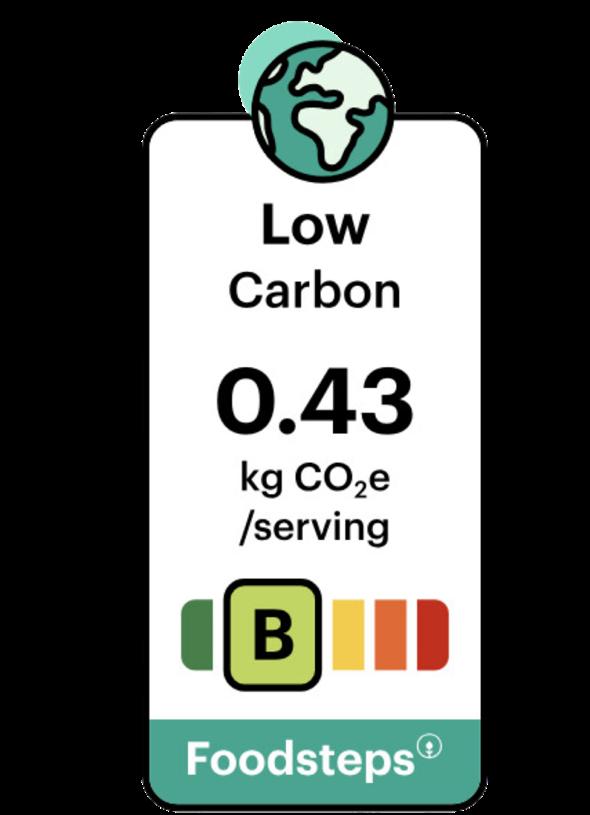

Honey
0.02 kg CO2e per serving
Red onions
0.02 kg CO2e per serving

Courgettes
0.04 kg CO2e per serving
Vegetable sausages
0.14 kg CO2e per serving

Sweet potatoes
0.07 kg CO2e per serving
Emissions from each life cycle stage:
Using vegetable sausages reduces the carbon impact of this recipe, versus traditional or other meat-based sausages.
Peppers
0.07 kg CO2e per serving




Summer is coming, so why not settle on the sun lounger whilst on holiday (or a bench during a break from work!) with one of these literary treats? From delicious recipes to life-affirming memoirs, let one of allmanhall’s buyers (and resident bibliophile,) Klaire Alexander shine some light and offer inspiration for your summer reading list!
Part memoir, part future survival guide, I found this book insightful, inspiring and even amusing in places. Always driven by a passion for sustainability, Dale left school aged 15. However, after building a wind turbine he was hit by the realisation that in order to change the world, he needed to be on grid and not off it, which resulted in the green energy company Ecotricity.
UN ambassador for climate issues, owner of the world’s first carbon neutral football club (allmanhall’s partner Forest Green Rovers) and vocal supporter of Extinction Rebellion, this book is perfect for anyone who wants to play even a small part in changing the world!
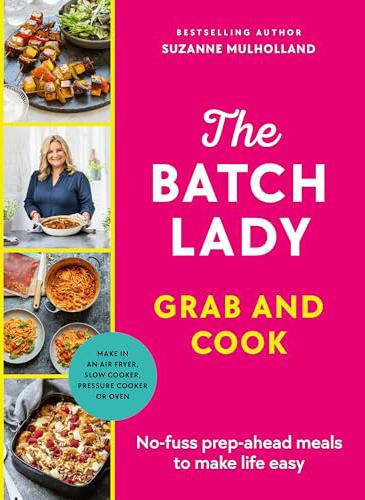


I love this book’s approach to meal preparation as it serves to help you put satisfying, wholesome meals on the table whilst practically eliminating food waste. Each recipe takes no more than 15 minutes to prepare and can be cooked right away or popped in the freezer and saved for an emergency!
All recipes have instructions for multiple appliances (including oven, air fryer, hob, slow cooker, microwave and barbeque) so simply select the one that suits your food service operation (or home kitchen!) and inject some fun into mealtimes. The colourful and infographic layout of this book makes it super eye-catching and appealing to the younger generation; it could be an excellent addition to the classroom within school environments or even in offices or dining areas.
 Author Klaire Alexander
Author Klaire Alexander



Although written over 50 years ago, this beloved tale has an environmental message that is even more valid today than it was in 1971. Though colourful, whimsical and perfectly suited to primary-aged children, this classic is emphasizing the dire consequences of deforestation and the resulting loss of animal species. The main message here is that respect for the environment and all living creatures will help us preserve the planet for ourselves and future generations.
Dr Seuss fans come in all shapes and sizes… I’m 43 and The Lorax will always be one of my favourites!
Here at allmanhall we stand by our belief that good food shouldn’t cost the Earth and in this new book, from former Bake-Off champion Nancy Birtwhistle, this point is really emphasised. From removing the toughest stains, to preparing wholesome and healthy meals, this book provides a collection of thoughtful and valuable advice whilst taking good care of the environment.
No matter what your age or background, this book’s combination of a ‘budget-friendly’ and ‘eco-friendly’ approach will help you beat some difficult challenges and feel empowered and resourceful.
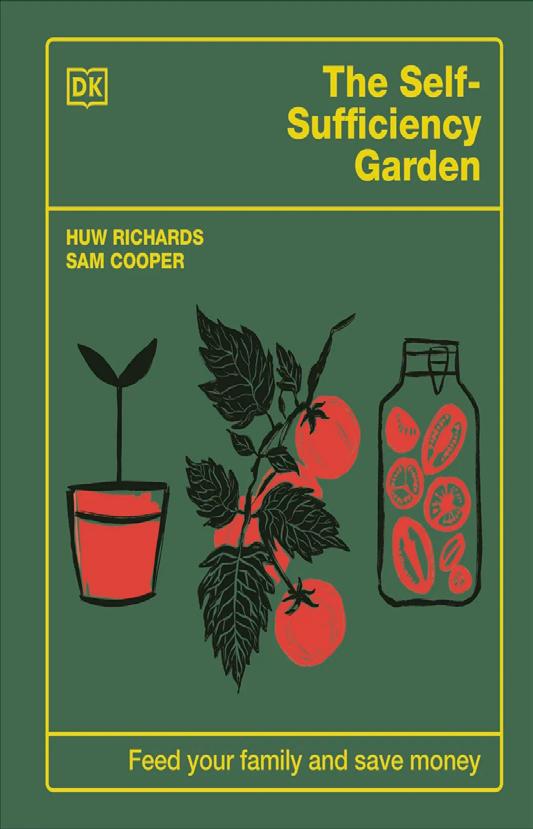
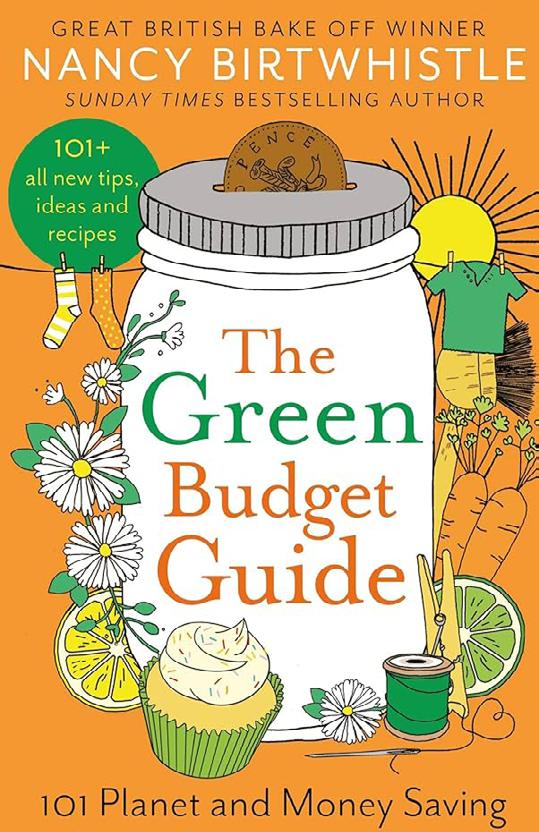
With the new season being a time for embracing fresh new challenges, this book is the perfect accompaniment for any aspirational gardener.
Huw Richards and Sam Cooper have spent the past two years planning and trialling their very own self-sufficiency plot. The layout of this book is really clear and easy-to-understand which makes it a pleasure to read and browse through. It offers plenty of truly inspiring recipes and great tips for preservation and storage.



